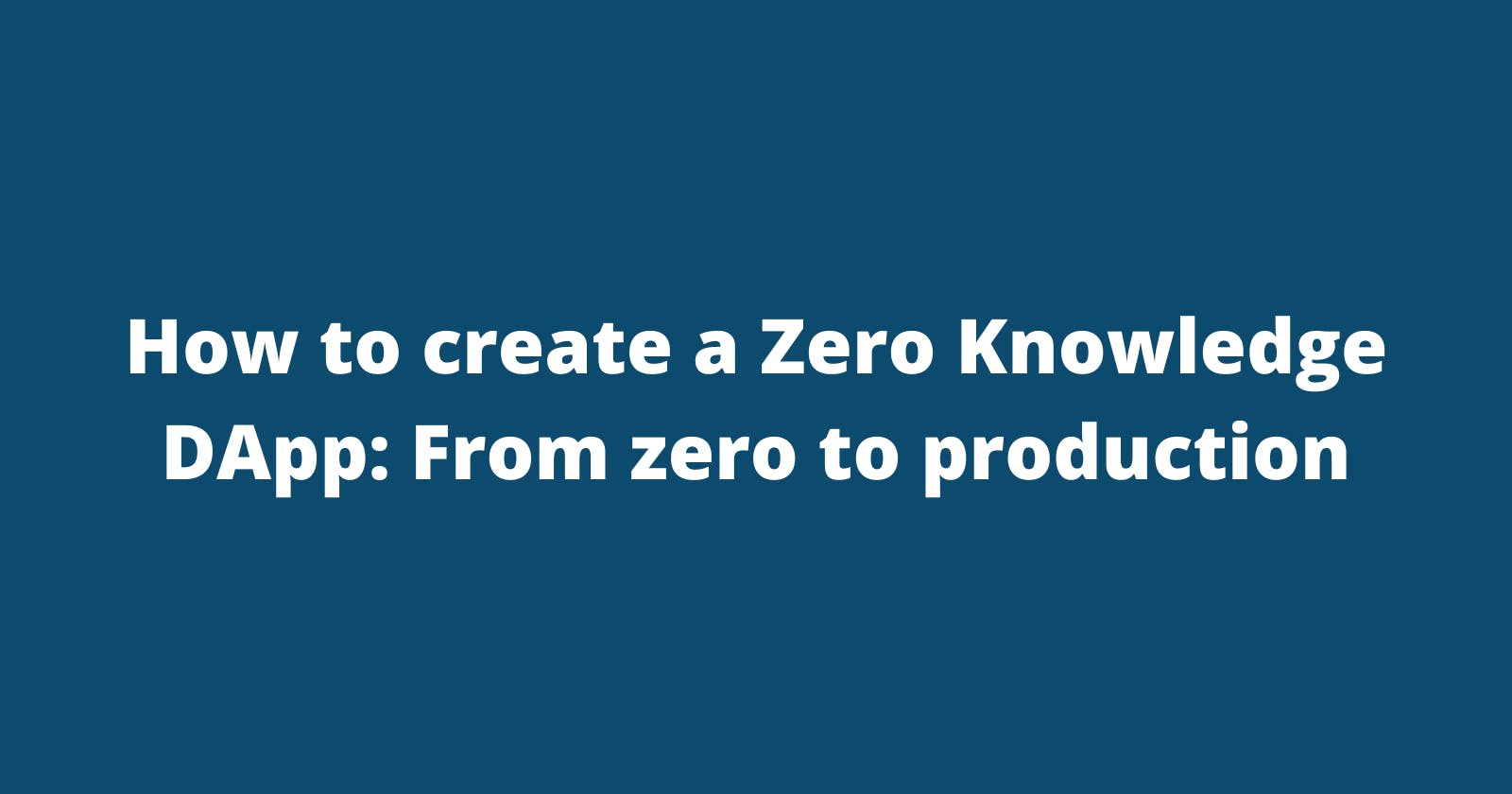Stay tuned: This article is being updated and the new version will be accessible through a new link that will be added here soon.
Here is the GitHub repository with the updated code: https://github.com/vplasencia/zk-sudoku-ts
This is a step-by-step guide on how to build a Zero Knowledge (zk) Decentralized Application (DApp) from zero to production.
The goal is to explain the flow of a zk dapp and deploy it so that users can use it.
We will create a zk DApp to prove that someone knows how to solve a sudoku game, without revealing the answer.
We will use Circom (for circuits), Solidity (for smart contracts) and Javascript (for the frontend).
I will cover circuits and smart contracts testing.
I will give some tips that I use to build and organize this kind of projects.
To build the zk dapp we will use Groth16 and then do the same but with Plonk.
If you want to understand more about some topics, click on the links.
All the code is open source so you can read the article and look at the code:
zkSudoku using Groth16: https://github.com/vplasencia/zkSudoku
zkSudoku using Plonk: https://github.com/vplasencia/zkSudoku-plonk
We will deploy smart contracts on Sepolia and the frontend on Vercel.
Install dependencies
These are some important dependencies that we will use:
Circuits
1. Create the circuit
- Create the
zkSudokufolder:
mkdir zkSudoku
- Go inside the
zkSudokufolder:
cd zkSudoku
- Create the
circuitsfolder:
mkdir circuits
- Go inside the
circuitsfolder:
cd circuits
- Create the
package.jsonfile:
yarn init -y
- Add the
circomliblibrary to use some circuits from there:
yarn add circomlib
Note: To know more about the circomlib library read the circomlib documentation.
- Create the
sudokufolder to write the circuit there:
mkdir sudoku
- Go inside the
sudokufolder:
cd sudoku
- Open a code editor inside the
sudokufolder.
Note: I use Visual Studio Code. To open Visual Studio Code, run:
code .
- Create the
sudoku.circomfile and add the circom code:
pragma circom 2.0.0;
include "../node_modules/circomlib/circuits/comparators.circom";
template Sudoku() {
signal input unsolved[9][9];
signal input solved[9][9];
// Check if the numbers of the solved sudoku are >=1 and <=9
// Each number in the solved sudoku is checked to see if it is >=1 and <=9
component getone[9][9];
component letnine[9][9];
for (var i = 0; i < 9; i++) {
for (var j = 0; j < 9; j++) {
letnine[i][j] = LessEqThan(32);
letnine[i][j].in[0] <== solved[i][j];
letnine[i][j].in[1] <== 9;
getone[i][j] = GreaterEqThan(32);
getone[i][j].in[0] <== solved[i][j];
getone[i][j].in[1] <== 1;
letnine[i][j].out === getone[i][j].out;
}
}
// Check if unsolved is the initial state of solved
// If unsolved[i][j] is not zero, it means that solved[i][j] is equal to unsolved[i][j]
// If unsolved[i][j] is zero, it means that solved [i][j] is different from unsolved[i][j]
component ieBoard[9][9];
component izBoard[9][9];
for (var i = 0; i < 9; i++) {
for (var j = 0; j < 9; j++) {
ieBoard[i][j] = IsEqual();
ieBoard[i][j].in[0] <== solved[i][j];
ieBoard[i][j].in[1] <== unsolved[i][j];
izBoard[i][j] = IsZero();
izBoard[i][j].in <== unsolved[i][j];
ieBoard[i][j].out === 1 - izBoard[i][j].out;
}
}
// Check if each row in solved has all the numbers from 1 to 9, both included
// For each element in solved, check that this element is not equal
// to previous elements in the same row
component ieRow[324];
var indexRow = 0;
for (var i = 0; i < 9; i++) {
for (var j = 0; j < 9; j++) {
for (var k = 0; k < j; k++) {
ieRow[indexRow] = IsEqual();
ieRow[indexRow].in[0] <== solved[i][k];
ieRow[indexRow].in[1] <== solved[i][j];
ieRow[indexRow].out === 0;
indexRow ++;
}
}
}
// Check if each column in solved has all the numbers from 1 to 9, both included
// For each element in solved, check that this element is not equal
// to previous elements in the same column
component ieCol[324];
var indexCol = 0;
for (var i = 0; i < 9; i++) {
for (var j = 0; j < 9; j++) {
for (var k = 0; k < i; k++) {
ieCol[indexCol] = IsEqual();
ieCol[indexCol].in[0] <== solved[k][j];
ieCol[indexCol].in[1] <== solved[i][j];
ieCol[indexCol].out === 0;
indexCol ++;
}
}
}
// Check if each square in solved has all the numbers from 1 to 9, both included
// For each square and for each element in each square, check that the
// element is not equal to previous elements in the same square
component ieSquare[324];
var indexSquare = 0;
for (var i = 0; i < 9; i+=3) {
for (var j = 0; j < 9; j+=3) {
for (var k = i; k < i+3; k++) {
for (var l = j; l < j+3; l++) {
for (var m = i; m <= k; m++) {
for (var n = j; n < l; n++){
ieSquare[indexSquare] = IsEqual();
ieSquare[indexSquare].in[0] <== solved[m][n];
ieSquare[indexSquare].in[1] <== solved[k][l];
ieSquare[indexSquare].out === 0;
indexSquare ++;
}
}
}
}
}
}
}
// unsolved is a public input signal. It is the unsolved sudoku
component main {public [unsolved]} = Sudoku();
2. Compile the circuit
- Create a
compile.shfile to use it every time you want to compile the circuit.
Note: All the .sh files created inside the zkSudoku/circuits/sudoku folder, are generic, so you can use them in your circuits.
You can use the compile.sh script by running the file and passing it the name of the circuit: ./compile.sh sudoku. Or you can edit the CIRCUIT variable inside the compile.sh file with the name of your circuit and run: ./compile.sh. The first time you run the script, you should run: chmod u+x compile.sh.
#!/bin/bash
# Variable to store the name of the circuit
CIRCUIT=sudoku
# In case there is a circuit name as input
if [ "$1" ]; then
CIRCUIT=$1
fi
# Compile the circuit
circom ${CIRCUIT}.circom --r1cs --wasm --sym --c
Note: To learn how the above file was created, read the snarkjs documentation.
- Run the file.
Run the first time:
chmod u+x compile.sh
And after that, you can always run:
./compile.sh
You should see something like this:

3. Add the input file
- Create the
input.jsonfile and add to it:
{
"unsolved": [
[0, 0, 0, 0, 0, 6, 0, 0, 0],
[0, 0, 7, 2, 0, 0, 8, 0, 0],
[9, 0, 6, 8, 0, 0, 0, 1, 0],
[3, 0, 0, 7, 0, 0, 0, 2, 9],
[0, 0, 0, 0, 0, 0, 0, 0, 0],
[4, 0, 0, 5, 0, 0, 0, 7, 0],
[6, 5, 0, 1, 0, 0, 0, 0, 0],
[8, 0, 1, 0, 5, 0, 3, 0, 0],
[7, 9, 2, 0, 0, 0, 0, 0, 4]
],
"solved": [
[1, 8, 4, 3, 7, 6, 2, 9, 5],
[5, 3, 7, 2, 9, 1, 8, 4, 6],
[9, 2, 6, 8, 4, 5, 7, 1, 3],
[3, 6, 5, 7, 1, 8, 4, 2, 9],
[2, 7, 8, 4, 6, 9, 5, 3, 1],
[4, 1, 9, 5, 3, 2, 6, 7, 8],
[6, 5, 3, 1, 2, 4, 9, 8, 7],
[8, 4, 1, 9, 5, 7, 3, 6, 2],
[7, 9, 2, 6, 8, 3, 1, 5, 4]
]
}
4. Generate the witness
- Create the
generateWitness.shfile and add to it:
#!/bin/bash
# Variable to store the name of the circuit
CIRCUIT=sudoku
# In case there is a circuit name as input
if [ "$1" ]; then
CIRCUIT=$1
fi
# Compile the circuit
circom ${CIRCUIT}.circom --r1cs --wasm --sym --c
# Generate the witness.wtns
node ${CIRCUIT}_js/generate_witness.js ${CIRCUIT}_js/${CIRCUIT}.wasm input.json ${CIRCUIT}_js/witness.wtns
Note: To learn how the above file was created, read the snarkjs documentation.
- Run the file
Run the first time:
chmod u+x generateWitness.sh
And after that, you can always run:
./generateWitness.sh
You can use the generateWitness.sh script by running the file and passing it the name of the circuit: ./generateWitness.sh sudoku. Or you can edit the CIRCUIT variable inside the generateWitness.sh file with the name of your circuit and run: ./generateWitness.sh. The first time you run the script, you should run: chmod u+x generateWitness.sh.
When you run the script you will see the witness.wtns file inside the sudoku_js folder.
5. Generate all the necessary files
Create the executeGroth16.sh file and add to it:
This is a generic file, it can be used with any circuit (it uses groth16). For example, if you want to run a circuit called circuit.circom with the ptau 12, you can run the script like this: ./executeGroth16.sh circuit 12 or you can also modify the CIRCUIT and PTAU variables like this: CIRCUIT=circuit and PTAU=12.
#!/bin/bash
# Variable to store the name of the circuit
CIRCUIT=sudoku
# Variable to store the number of the ptau file
PTAU=14
# In case there is a circuit name as an input
if [ "$1" ]; then
CIRCUIT=$1
fi
# In case there is a ptau file number as an input
if [ "$2" ]; then
PTAU=$2
fi
# Check if the necessary ptau file already exists. If it does not exist, it will be downloaded from the data center
if [ -f ./ptau/powersOfTau28_hez_final_${PTAU}.ptau ]; then
echo "----- powersOfTau28_hez_final_${PTAU}.ptau already exists -----"
else
echo "----- Download powersOfTau28_hez_final_${PTAU}.ptau -----"
wget -P ./ptau https://hermez.s3-eu-west-1.amazonaws.com/powersOfTau28_hez_final_${PTAU}.ptau
fi
# Compile the circuit
circom ${CIRCUIT}.circom --r1cs --wasm --sym --c
# Generate the witness.wtns
node ${CIRCUIT}_js/generate_witness.js ${CIRCUIT}_js/${CIRCUIT}.wasm input.json ${CIRCUIT}_js/witness.wtns
echo "----- Generate .zkey file -----"
# Generate a .zkey file that will contain the proving and verification keys together with all phase 2 contributions
snarkjs groth16 setup ${CIRCUIT}.r1cs ptau/powersOfTau28_hez_final_${PTAU}.ptau ${CIRCUIT}_0000.zkey
echo "----- Contribute to the phase 2 of the ceremony -----"
# Contribute to the phase 2 of the ceremony
snarkjs zkey contribute ${CIRCUIT}_0000.zkey ${CIRCUIT}_final.zkey --name="1st Contributor Name" -v -e="some random text"
echo "----- Export the verification key -----"
# Export the verification key
snarkjs zkey export verificationkey ${CIRCUIT}_final.zkey verification_key.json
echo "----- Generate zk-proof -----"
# Generate a zk-proof associated to the circuit and the witness. This generates proof.json and public.json
snarkjs groth16 prove ${CIRCUIT}_final.zkey ${CIRCUIT}_js/witness.wtns proof.json public.json
echo "----- Verify the proof -----"
# Verify the proof
snarkjs groth16 verify verification_key.json public.json proof.json
echo "----- Generate Solidity verifier -----"
# Generate a Solidity verifier that allows verifying proofs on Ethereum blockchain
snarkjs zkey export solidityverifier ${CIRCUIT}_final.zkey ${CIRCUIT}Verifier.sol
# Update the solidity version in the Solidity verifier
sed -i 's/0.6.11;/0.8.4;/g' ${CIRCUIT}Verifier.sol
# Update the contract name in the Solidity verifier
sed -i "s/contract Verifier/contract ${CIRCUIT^}Verifier/g" ${CIRCUIT}Verifier.sol
echo "----- Generate and print parameters of call -----"
# Generate and print parameters of call
snarkjs generatecall | tee parameters.txt
Note: To learn how the above file was created, read the snarkjs documentation.
- Run the file
Run the first time:
chmod u+x executeGroth16.sh
And after that, you can always run:
./executeGroth16.sh
When you run the script if everything was correct, you will see [INFO] snarkJS: OK!:
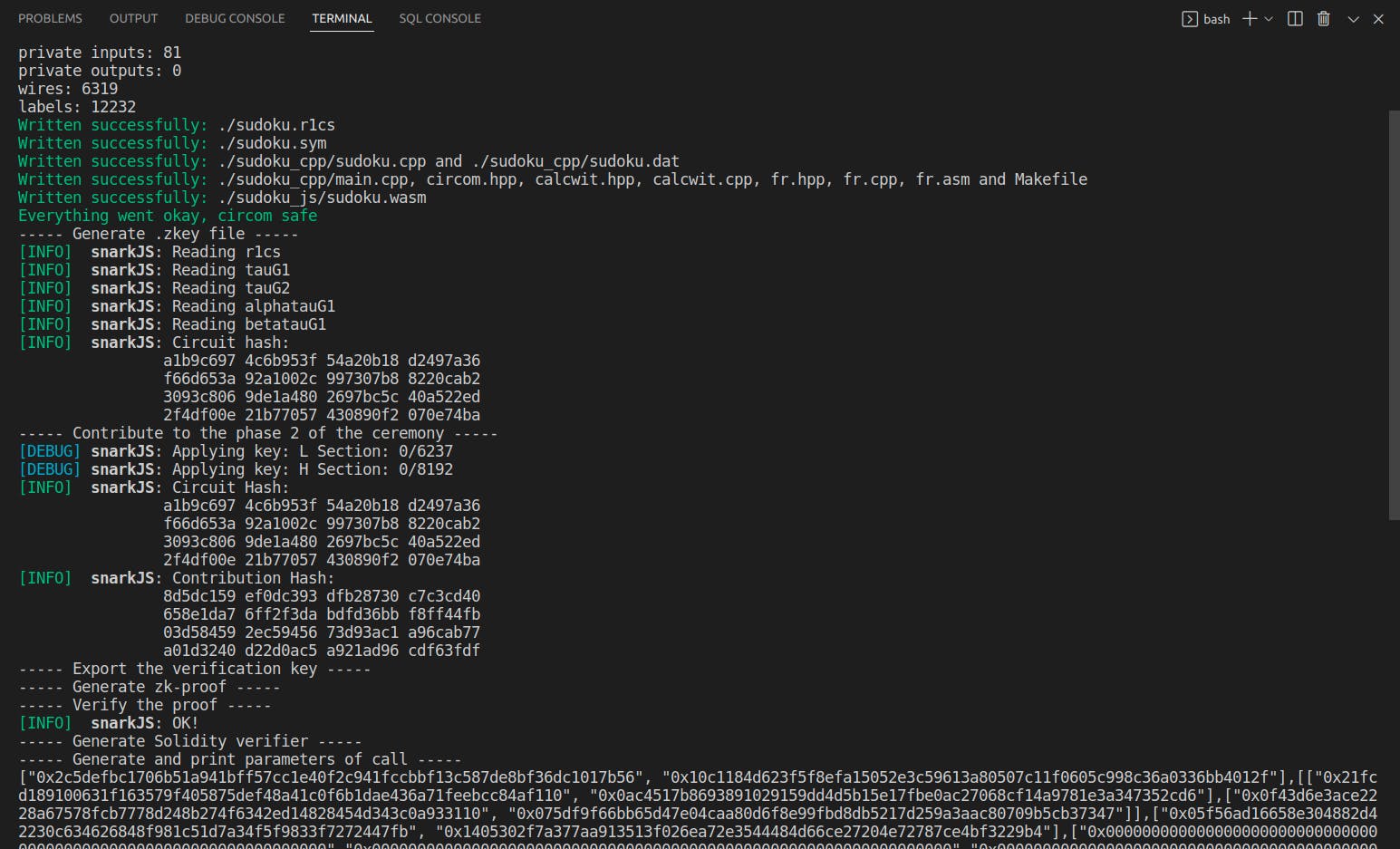
6. Test circuits
- Go inside the
circuitsfolder and open a code editor.
Note: I use Visual Studio Code. To open Visual Studio Code, run:
code .
Install Dependencies:
- Install chai as a dev dependency:
yarn add -D chai
- Install circom_tester:
yarn add circom_tester
Create a
testfolder.Inside the
testfolder, create acircuits.jsfile and add to it:
const { assert } = require("chai");
const wasm_tester = require("circom_tester").wasm;
describe("Sudoku circuit", function () {
let sudokuCircuit;
before(async function () {
sudokuCircuit = await wasm_tester("sudoku/sudoku.circom");
});
it("Should generate the witness successfully", async function () {
let input = {
unsolved: [
[0, 0, 0, 0, 0, 6, 0, 0, 0],
[0, 0, 7, 2, 0, 0, 8, 0, 0],
[9, 0, 6, 8, 0, 0, 0, 1, 0],
[3, 0, 0, 7, 0, 0, 0, 2, 9],
[0, 0, 0, 0, 0, 0, 0, 0, 0],
[4, 0, 0, 5, 0, 0, 0, 7, 0],
[6, 5, 0, 1, 0, 0, 0, 0, 0],
[8, 0, 1, 0, 5, 0, 3, 0, 0],
[7, 9, 2, 0, 0, 0, 0, 0, 4],
],
solved: [
[1, 8, 4, 3, 7, 6, 2, 9, 5],
[5, 3, 7, 2, 9, 1, 8, 4, 6],
[9, 2, 6, 8, 4, 5, 7, 1, 3],
[3, 6, 5, 7, 1, 8, 4, 2, 9],
[2, 7, 8, 4, 6, 9, 5, 3, 1],
[4, 1, 9, 5, 3, 2, 6, 7, 8],
[6, 5, 3, 1, 2, 4, 9, 8, 7],
[8, 4, 1, 9, 5, 7, 3, 6, 2],
[7, 9, 2, 6, 8, 3, 1, 5, 4],
],
};
const witness = await sudokuCircuit.calculateWitness(input);
await sudokuCircuit.assertOut(witness, {});
});
it("Should fail because there is a number out of bounds", async function () {
// The number 10 in the first row of solved is > 9
let input = {
unsolved: [
[0, 0, 0, 0, 0, 6, 0, 0, 0],
[0, 0, 7, 2, 0, 0, 8, 0, 0],
[9, 0, 6, 8, 0, 0, 0, 1, 0],
[3, 0, 0, 7, 0, 0, 0, 2, 9],
[0, 0, 0, 0, 0, 0, 0, 0, 0],
[4, 0, 0, 5, 0, 0, 0, 7, 0],
[6, 5, 0, 1, 0, 0, 0, 0, 0],
[8, 0, 1, 0, 5, 0, 3, 0, 0],
[7, 9, 2, 0, 0, 0, 0, 0, 4],
],
solved: [
[1, 8, 4, 3, 7, 6, 2, 9, 10],
[5, 3, 7, 2, 9, 1, 8, 4, 6],
[9, 2, 6, 8, 4, 5, 7, 1, 3],
[3, 6, 5, 7, 1, 8, 4, 2, 9],
[2, 7, 8, 4, 6, 9, 5, 3, 1],
[4, 1, 9, 5, 3, 2, 6, 7, 8],
[6, 5, 3, 1, 2, 4, 9, 8, 7],
[8, 4, 1, 9, 5, 7, 3, 6, 2],
[7, 9, 2, 6, 8, 3, 1, 5, 4],
],
};
try {
await sudokuCircuit.calculateWitness(input);
} catch (err) {
// console.log(err);
assert(err.message.includes("Assert Failed"));
}
});
it("Should fail because unsolved is not the initial state of solved", async function () {
// unsolved is not the initial state of solved
let input = {
unsolved: [
[0, 0, 0, 0, 0, 6, 0, 0, 0],
[0, 0, 7, 2, 0, 0, 8, 0, 0],
[9, 0, 6, 8, 0, 0, 0, 1, 0],
[3, 0, 0, 7, 0, 0, 0, 2, 9],
[0, 0, 0, 0, 0, 0, 0, 0, 0],
[4, 0, 0, 5, 0, 0, 0, 7, 0],
[6, 5, 0, 1, 0, 0, 0, 0, 0],
[8, 0, 1, 0, 5, 0, 3, 0, 0],
[7, 9, 2, 0, 0, 0, 0, 0, 4],
],
solved: [
[1, 2, 7, 5, 8, 4, 6, 9, 3],
[8, 5, 6, 3, 7, 9, 1, 2, 4],
[3, 4, 9, 6, 2, 1, 8, 7, 5],
[4, 7, 1, 9, 5, 8, 2, 3, 6],
[2, 6, 8, 7, 1, 3, 5, 4, 9],
[9, 3, 5, 4, 6, 2, 7, 1, 8],
[5, 8, 3, 2, 9, 7, 4, 6, 1],
[7, 1, 4, 8, 3, 6, 9, 5, 2],
[6, 9, 2, 1, 4, 5, 3, 8, 7],
],
};
try {
await sudokuCircuit.calculateWitness(input);
} catch (err) {
// console.log(err);
assert(err.message.includes("Assert Failed"));
}
});
it("Should fail due to repeated numbers in a row", async function () {
// The number 1 in the first row of solved is twice
let input = {
unsolved: [
[0, 0, 0, 0, 0, 6, 0, 0, 0],
[0, 0, 7, 2, 0, 0, 8, 0, 0],
[9, 0, 6, 8, 0, 0, 0, 1, 0],
[3, 0, 0, 7, 0, 0, 0, 2, 9],
[0, 0, 0, 0, 0, 0, 0, 0, 0],
[4, 0, 0, 5, 0, 0, 0, 7, 0],
[6, 5, 0, 1, 0, 0, 0, 0, 0],
[8, 0, 1, 0, 5, 0, 3, 0, 0],
[7, 9, 2, 0, 0, 0, 0, 0, 4],
],
solved: [
[1, 8, 4, 3, 7, 6, 2, 9, 1],
[5, 3, 7, 2, 9, 1, 8, 4, 6],
[9, 2, 6, 8, 4, 5, 7, 1, 3],
[3, 6, 5, 7, 1, 8, 4, 2, 9],
[2, 7, 8, 4, 6, 9, 5, 3, 1],
[4, 1, 9, 5, 3, 2, 6, 7, 8],
[6, 5, 3, 1, 2, 4, 9, 8, 7],
[8, 4, 1, 9, 5, 7, 3, 6, 2],
[7, 9, 2, 6, 8, 3, 1, 5, 4],
],
};
try {
await sudokuCircuit.calculateWitness(input);
} catch (err) {
// console.log(err);
assert(err.message.includes("Assert Failed"));
}
});
it("Should fail due to repeated numbers in a column", async function () {
// The number 4 in the first column of solved is twice and the number 7 in the last column of solved is twice too
let input = {
unsolved: [
[0, 0, 0, 0, 0, 0, 0, 0, 0],
[0, 0, 0, 0, 0, 0, 0, 0, 0],
[0, 0, 0, 0, 0, 0, 0, 0, 0],
[0, 0, 0, 0, 0, 0, 0, 0, 0],
[0, 0, 0, 0, 0, 0, 0, 0, 0],
[0, 0, 0, 0, 0, 0, 0, 0, 0],
[0, 0, 0, 0, 0, 0, 0, 0, 0],
[0, 0, 0, 0, 0, 0, 0, 0, 0],
[0, 0, 0, 0, 0, 0, 0, 0, 0],
],
solved: [
[1, 8, 4, 3, 7, 6, 2, 9, 5],
[5, 3, 7, 2, 9, 1, 8, 4, 6],
[9, 2, 6, 8, 4, 5, 7, 1, 3],
[3, 6, 5, 7, 1, 8, 4, 2, 9],
[2, 7, 8, 4, 6, 9, 5, 3, 1],
[4, 1, 9, 5, 3, 2, 6, 7, 8],
[6, 5, 3, 1, 2, 4, 9, 8, 7],
[8, 4, 1, 9, 5, 7, 3, 6, 2],
[4, 9, 2, 6, 8, 3, 1, 5, 7],
],
};
try {
await sudokuCircuit.calculateWitness(input);
} catch (err) {
// console.log(err);
assert(err.message.includes("Assert Failed"));
}
});
it("Should fail due to repeated numbers in a square", async function () {
// The number 1 in the first square (top-left) of solved is twice
let input = {
unsolved: [
[0, 0, 0, 0, 0, 0, 0, 0, 0],
[0, 0, 0, 0, 0, 0, 0, 0, 0],
[0, 0, 0, 0, 0, 0, 0, 0, 0],
[0, 0, 0, 0, 0, 0, 0, 0, 0],
[0, 0, 0, 0, 0, 0, 0, 0, 0],
[0, 0, 0, 0, 0, 0, 0, 0, 0],
[0, 0, 0, 0, 0, 0, 0, 0, 0],
[0, 0, 0, 0, 0, 0, 0, 0, 0],
[0, 0, 0, 0, 0, 0, 0, 0, 0],
],
solved: [
[1, 8, 4, 3, 7, 6, 2, 9, 5],
[5, 3, 7, 2, 9, 1, 8, 4, 6],
[9, 2, 1, 8, 4, 5, 7, 6, 3],
[3, 6, 5, 7, 1, 8, 4, 2, 9],
[2, 7, 8, 4, 6, 9, 5, 3, 1],
[4, 1, 9, 5, 3, 2, 6, 7, 8],
[6, 5, 3, 1, 2, 4, 9, 8, 7],
[8, 4, 6, 9, 5, 7, 3, 1, 2],
[7, 9, 2, 6, 8, 3, 1, 5, 4],
],
};
try {
await sudokuCircuit.calculateWitness(input);
} catch (err) {
// console.log(err);
assert(err.message.includes("Assert Failed"));
}
});
});
- To run tests using
yarn testornpm testinstead ofmocha test, inside thepackage.jsonfile add:
"scripts": {
"test": "mocha"
},
The package.json file will look like this:
{
"name": "circuits",
"version": "1.0.0",
"main": "index.js",
"license": "MIT",
"scripts": {
"test": "mocha"
},
"dependencies": {
"circom_tester": "^0.0.11",
"circomlib": "^2.0.3"
},
"devDependencies": {
"chai": "^4.3.6"
}
}
- Run tests:
yarn test
You will see:
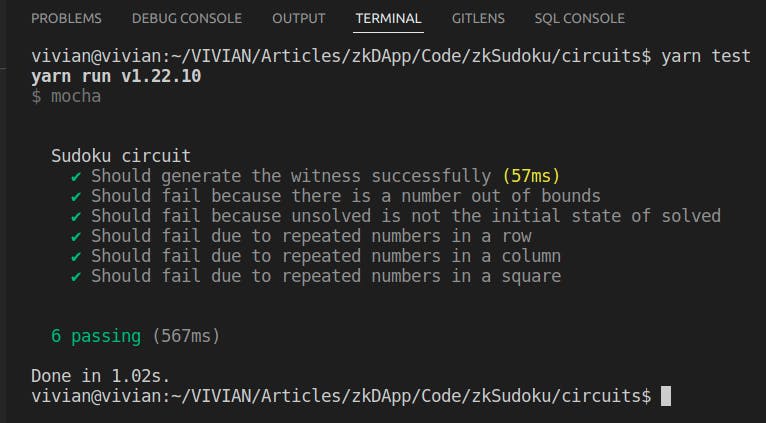
- If you uncomment the console logs, you will see that each test that should fail, is failing on the line of the circuit that should fail.

In this case it is line 114: ieSquare[indexSquare].out === 0;, when we check that elements are not equal to other elements in the same square.
Smart Contracts
7. Set up the local environment to work with smart contracts
For setting up the local environment to work with smart contracts, we are going to use the hardhat library. To know more about hardhat, read the hardhat documentation.
Open a terminal inside the
zkSudokufolder.Create the
contractsfolder:
mkdir contracts
- Go inside the
contractsfolder:
cd contracts
- Create the
package.jsonfile:
yarn init -y
- Add the
hardhatlibrary to work locally with smart contracts:
yarn add -D hardhat
- Create the hardhat project:
npx hardhat
Select
Create a basic sample project(it is the default option) and accept everything (press Enter).Compile and test smart contracts to make sure that everything is correct.
To compile the contracts, run:
npx hardhat compile
- To test contracts, run:
npx hardhat test
- Open a code editor (inside the
zkSudoku/contractsfolder, in the hardhat project created).
Note: I use Visual Studio Code. To open Visual Studio Code, run:
code .
Delete these files (do not delete the folders):
sample-test.jsinside thetestfoldersample-script.jsinside thescriptsfolderGreeter.solinside thecontractsfolder
8. Create smart contracts
- Copy the
sudokuVerifier.solgenerated before.
You can copy the file or you can run this:
cp ../circuits/sudoku/sudokuVerifier.sol contracts
- Inside the
zkSudoku/contracts/contractsfolder, create theSudoku.solfile and add to it:
//SPDX-License-Identifier: Unlicense
pragma solidity ^0.8.4;
interface IVerifier {
function verifyProof(
uint256[2] memory a,
uint256[2][2] memory b,
uint256[2] memory c,
uint256[81] memory input
) external view returns (bool);
}
contract Sudoku {
address public verifierAddr;
uint8[9][9][3] sudokuBoardList = [
[
[1, 2, 7, 5, 8, 4, 6, 9, 3],
[8, 5, 6, 3, 7, 9, 1, 2, 4],
[3, 4, 9, 6, 2, 1, 8, 7, 5],
[4, 7, 1, 9, 5, 8, 2, 3, 6],
[2, 6, 8, 7, 1, 3, 5, 4, 9],
[9, 3, 5, 4, 6, 2, 7, 1, 8],
[5, 8, 3, 2, 9, 7, 4, 6, 1],
[7, 1, 4, 8, 3, 6, 9, 5, 2],
[6, 9, 2, 1, 4, 5, 3, 0, 7]
],
[
[0, 2, 7, 5, 0, 4, 0, 0, 0],
[0, 0, 0, 3, 7, 0, 0, 0, 4],
[3, 0, 0, 0, 0, 0, 8, 0, 0],
[4, 7, 0, 9, 5, 8, 0, 3, 6],
[2, 6, 8, 7, 1, 0, 0, 4, 9],
[0, 0, 0, 0, 0, 2, 0, 1, 8],
[0, 8, 3, 0, 9, 0, 4, 0, 0],
[7, 1, 0, 0, 0, 0, 9, 0, 2],
[0, 0, 0, 0, 0, 5, 0, 0, 7]
],
[
[0, 0, 0, 0, 0, 6, 0, 0, 0],
[0, 0, 7, 2, 0, 0, 8, 0, 0],
[9, 0, 6, 8, 0, 0, 0, 1, 0],
[3, 0, 0, 7, 0, 0, 0, 2, 9],
[0, 0, 0, 0, 0, 0, 0, 0, 0],
[4, 0, 0, 5, 0, 0, 0, 7, 0],
[6, 5, 0, 1, 0, 0, 0, 0, 0],
[8, 0, 1, 0, 5, 0, 3, 0, 0],
[7, 9, 2, 0, 0, 0, 0, 0, 4]
]
];
constructor(address _verifierAddr) {
verifierAddr = _verifierAddr;
}
function verifyProof(
uint256[2] memory a,
uint256[2][2] memory b,
uint256[2] memory c,
uint256[81] memory input
) public view returns (bool) {
return IVerifier(verifierAddr).verifyProof(a, b, c, input);
}
function verifySudokuBoard(uint256[81] memory board)
private
view
returns (bool)
{
bool isEqual = true;
for (uint256 i = 0; i < sudokuBoardList.length; ++i) {
isEqual = true;
for (uint256 j = 0; j < sudokuBoardList[i].length; ++j) {
for (uint256 k = 0; k < sudokuBoardList[i][j].length; ++k) {
if (board[9 * j + k] != sudokuBoardList[i][j][k]) {
isEqual = false;
break;
}
}
}
if (isEqual == true) {
return isEqual;
}
}
return isEqual;
}
function verifySudoku(
uint256[2] memory a,
uint256[2][2] memory b,
uint256[2] memory c,
uint256[81] memory input
) public view returns (bool) {
require(verifySudokuBoard(input), "This board does not exist");
require(verifyProof(a, b, c, input), "Filed proof check");
return true;
}
function pickRandomBoard(string memory stringTime)
private
view
returns (uint8[9][9] memory)
{
uint256 randPosition = uint256(
keccak256(
abi.encodePacked(
block.difficulty,
block.timestamp,
msg.sender,
stringTime
)
)
) % sudokuBoardList.length;
return sudokuBoardList[randPosition];
}
function generateSudokuBoard(string memory stringTime)
public
view
returns (uint8[9][9] memory)
{
return pickRandomBoard(stringTime);
}
}
- Smart contracts graph:
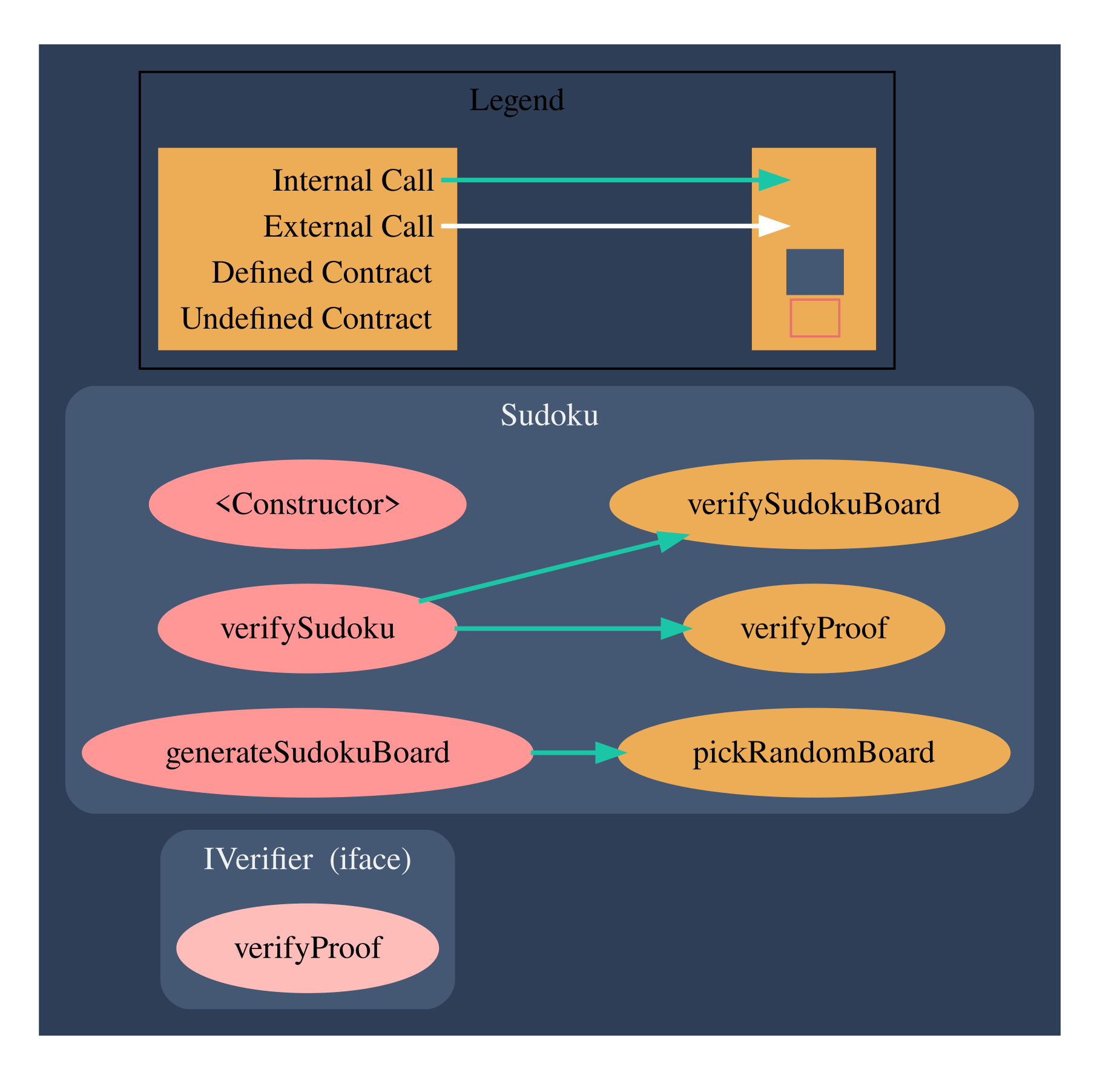
9. Test smart contracts
- Add the snarkjs library to test the generation of the proof:
yarn add snarkjs
Note: Make sure you have the same global and local version of snarkjs.
1- To check the global snarkjs version, open a console and run:
snarkjs -v
You will see something like this:

2- To check the local snarkjs version, go to the package.json file and check the snarkjs version there. You will see something like this:
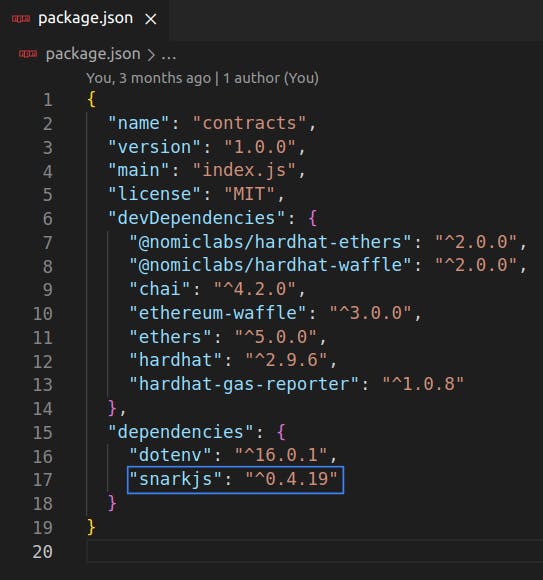
You can see that both versions of snarkjs are the same: 0.4.19.
- Create a
zkprooffolder:
mkdir zkproof
Copy the
sudoku.wasmandsudoku_final.zkeyfiles inside thezkprooffolder created before:- Copy the
sudoku.wasmfile inside thezkprooffolder or run:
- Copy the
cp ../circuits/sudoku/sudoku_js/sudoku.wasm zkproof
- Copy the
sudoku_final.zkeyfile inside thezkprooffolder or run:
cp ../circuits/sudoku/sudoku_final.zkey zkproof
- Add a
test.jsfile inside thetestfolder and add to it:
const { expect } = require("chai");
const { ethers } = require("hardhat");
const { exportCallDataGroth16 } = require("./utils/utils");
describe("Sudoku", function () {
let SudokuVerifier, sudokuVerifier, Sudoku, sudoku;
before(async function () {
SudokuVerifier = await ethers.getContractFactory("SudokuVerifier");
sudokuVerifier = await SudokuVerifier.deploy();
await sudokuVerifier.deployed();
Sudoku = await ethers.getContractFactory("Sudoku");
sudoku = await Sudoku.deploy(sudokuVerifier.address);
await sudoku.deployed();
});
it("Should generate a board", async function () {
let board = await sudoku.generateSudokuBoard(new Date().toString());
expect(board.length).to.equal(9);
});
it("Should return true for valid proof on-chain", async function () {
const unsolved = [
[1, 2, 7, 5, 8, 4, 6, 9, 3],
[8, 5, 6, 3, 7, 9, 1, 2, 4],
[3, 4, 9, 6, 2, 1, 8, 7, 5],
[4, 7, 1, 9, 5, 8, 2, 3, 6],
[2, 6, 8, 7, 1, 3, 5, 4, 9],
[9, 3, 5, 4, 6, 2, 7, 1, 8],
[5, 8, 3, 2, 9, 7, 4, 6, 1],
[7, 1, 4, 8, 3, 6, 9, 5, 2],
[6, 9, 2, 1, 4, 5, 3, 0, 7],
];
const solved = [
[1, 2, 7, 5, 8, 4, 6, 9, 3],
[8, 5, 6, 3, 7, 9, 1, 2, 4],
[3, 4, 9, 6, 2, 1, 8, 7, 5],
[4, 7, 1, 9, 5, 8, 2, 3, 6],
[2, 6, 8, 7, 1, 3, 5, 4, 9],
[9, 3, 5, 4, 6, 2, 7, 1, 8],
[5, 8, 3, 2, 9, 7, 4, 6, 1],
[7, 1, 4, 8, 3, 6, 9, 5, 2],
[6, 9, 2, 1, 4, 5, 3, 8, 7],
];
const input = {
unsolved: unsolved,
solved: solved,
};
let dataResult = await exportCallDataGroth16(
input,
"./zkproof/sudoku.wasm",
"./zkproof/sudoku_final.zkey"
);
// Call the function.
let result = await sudokuVerifier.verifyProof(
dataResult.a,
dataResult.b,
dataResult.c,
dataResult.Input
);
expect(result).to.equal(true);
});
it("Should return false for invalid proof on-chain", async function () {
let a = [0, 0];
let b = [
[0, 0],
[0, 0],
];
let c = [0, 0];
let Input = new Array(81).fill(0);
let dataResult = { a, b, c, Input };
// Call the function.
let result = await sudokuVerifier.verifyProof(
dataResult.a,
dataResult.b,
dataResult.c,
dataResult.Input
);
expect(result).to.equal(false);
});
it("Should verify Sudoku successfully", async function () {
const unsolved = [
[1, 2, 7, 5, 8, 4, 6, 9, 3],
[8, 5, 6, 3, 7, 9, 1, 2, 4],
[3, 4, 9, 6, 2, 1, 8, 7, 5],
[4, 7, 1, 9, 5, 8, 2, 3, 6],
[2, 6, 8, 7, 1, 3, 5, 4, 9],
[9, 3, 5, 4, 6, 2, 7, 1, 8],
[5, 8, 3, 2, 9, 7, 4, 6, 1],
[7, 1, 4, 8, 3, 6, 9, 5, 2],
[6, 9, 2, 1, 4, 5, 3, 0, 7],
];
const solved = [
[1, 2, 7, 5, 8, 4, 6, 9, 3],
[8, 5, 6, 3, 7, 9, 1, 2, 4],
[3, 4, 9, 6, 2, 1, 8, 7, 5],
[4, 7, 1, 9, 5, 8, 2, 3, 6],
[2, 6, 8, 7, 1, 3, 5, 4, 9],
[9, 3, 5, 4, 6, 2, 7, 1, 8],
[5, 8, 3, 2, 9, 7, 4, 6, 1],
[7, 1, 4, 8, 3, 6, 9, 5, 2],
[6, 9, 2, 1, 4, 5, 3, 8, 7],
];
const input = {
unsolved: unsolved,
solved: solved,
};
let dataResult = await exportCallDataGroth16(
input,
"./zkproof/sudoku.wasm",
"./zkproof/sudoku_final.zkey"
);
// Call the function.
let result = await sudoku.verifySudoku(
dataResult.a,
dataResult.b,
dataResult.c,
dataResult.Input
);
expect(result).to.equal(true);
});
it("Should be reverted on Sudoku verification because the board is not in the board list", async function () {
const unsolved = [
[1, 2, 7, 5, 8, 4, 6, 9, 3],
[8, 5, 6, 3, 7, 9, 1, 2, 4],
[3, 4, 9, 6, 2, 1, 8, 7, 5],
[4, 7, 1, 9, 5, 8, 2, 3, 6],
[2, 6, 8, 7, 1, 3, 5, 4, 9],
[9, 3, 5, 4, 6, 2, 7, 1, 8],
[5, 8, 3, 2, 9, 7, 4, 6, 1],
[7, 1, 4, 8, 3, 6, 9, 5, 2],
[6, 9, 2, 1, 4, 5, 3, 8, 0],
];
const solved = [
[1, 2, 7, 5, 8, 4, 6, 9, 3],
[8, 5, 6, 3, 7, 9, 1, 2, 4],
[3, 4, 9, 6, 2, 1, 8, 7, 5],
[4, 7, 1, 9, 5, 8, 2, 3, 6],
[2, 6, 8, 7, 1, 3, 5, 4, 9],
[9, 3, 5, 4, 6, 2, 7, 1, 8],
[5, 8, 3, 2, 9, 7, 4, 6, 1],
[7, 1, 4, 8, 3, 6, 9, 5, 2],
[6, 9, 2, 1, 4, 5, 3, 8, 7],
];
const input = {
unsolved: unsolved,
solved: solved,
};
let dataResult = await exportCallDataGroth16(
input,
"./zkproof/sudoku.wasm",
"./zkproof/sudoku_final.zkey"
);
await expect(
sudoku.verifySudoku(
dataResult.a,
dataResult.b,
dataResult.c,
dataResult.Input
)
).to.be.reverted;
});
});
Inside a
testfolder, create autilsfolder.Inside the
utilsfolder, create autils.jsfile and add to it:
const { groth16 } = require("snarkjs");
async function exportCallDataGroth16(input, wasmPath, zkeyPath) {
const { proof: _proof, publicSignals: _publicSignals } =
await groth16.fullProve(input, wasmPath, zkeyPath);
const calldata = await groth16.exportSolidityCallData(_proof, _publicSignals);
const argv = calldata
.replace(/["[\]\s]/g, "")
.split(",")
.map((x) => BigInt(x).toString());
const a = [argv[0], argv[1]];
const b = [
[argv[2], argv[3]],
[argv[4], argv[5]],
];
const c = [argv[6], argv[7]];
const Input = [];
for (let i = 8; i < argv.length; i++) {
Input.push(argv[i]);
}
return { a, b, c, Input };
}
module.exports = {
exportCallDataGroth16,
};
- To have the gas reporter when testing smart contracts, install the hardhat-gas-reporter library. Run:
yarn add -D hardhat-gas-reporter
Then, in the hardhat.config.js file, after the last require, at the top, add:
require("hardhat-gas-reporter");
- To add the optimizer, modify your solidity config in the
hardhat.config.jsfile like this:
solidity: {
version: "0.8.4",
settings: {
optimizer: {
enabled: true,
runs: 200,
},
},
},
- To test contracts, run:
npx hardhat test
When you run the above line, you will see:
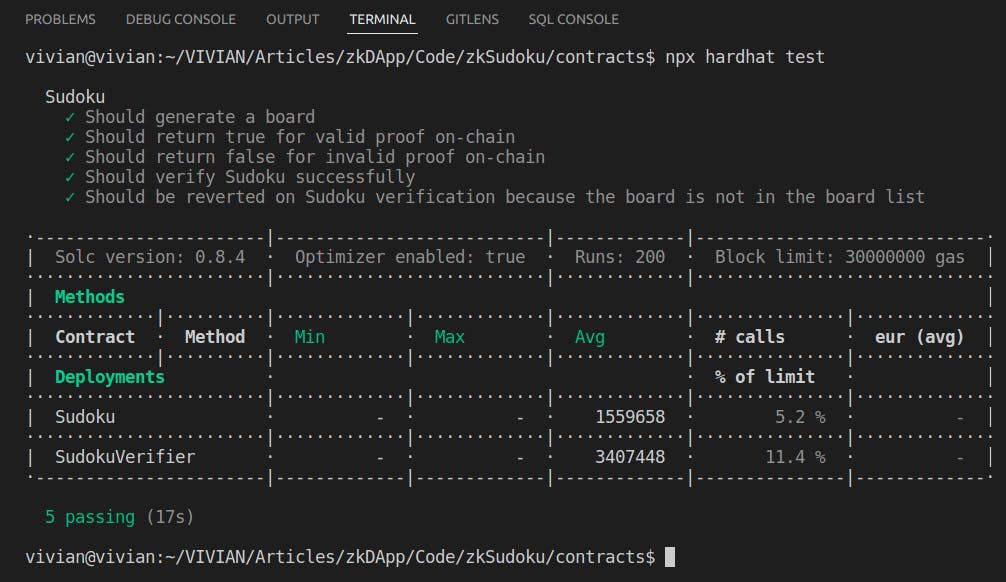
10. Run smart contracts
- Inside the
scriptsfolder, add arun.jsfile (to play around with smart contracts) and add to it:
const main = async () => {
const SudokuVerifier = await hre.ethers.getContractFactory("SudokuVerifier");
const sudokuVerifier = await SudokuVerifier.deploy();
await sudokuVerifier.deployed();
console.log("SudokuVerifier Contract deployed to:", sudokuVerifier.address);
const Sudoku = await hre.ethers.getContractFactory("Sudoku");
const sudoku = await Sudoku.deploy(sudokuVerifier.address);
await sudoku.deployed();
console.log("Sudoku Contract deployed to:", sudoku.address);
let board = await sudoku.generateSudokuBoard(new Date().toString());
console.log(board);
let callDataSudoku = [
[
"0x2c5defbc1706b51a941bff57cc1e40f2c941fccbbf13c587de8bf36dc1017b56",
"0x10c1184d623f5f8efa15052e3c59613a80507c11f0605c998c36a0336bb4012f",
],
[
[
"0x21fcd189100631f163579f405875def48a41c0f6b1dae436a71feebcc84af110",
"0x0ac4517b8693891029159dd4d5b15e17fbe0ac27068cf14a9781e3a347352cd6",
],
[
"0x0f43d6e3ace2228a67578fcb7778d248b274f6342ed14828454d343c0a933110",
"0x075df9f66bb65d47e04caa80d6f8e99fbd8db5217d259a3aac80709b5cb37347",
],
],
[
"0x05f56ad16658e304882d42230c634626848f981c51d7a34f5f9833f7272447fb",
"0x1405302f7a377aa913513f026ea72e3544484d66ce27204e72787ce4bf3229b4",
],
[
"0x0000000000000000000000000000000000000000000000000000000000000000",
"0x0000000000000000000000000000000000000000000000000000000000000000",
"0x0000000000000000000000000000000000000000000000000000000000000000",
"0x0000000000000000000000000000000000000000000000000000000000000000",
"0x0000000000000000000000000000000000000000000000000000000000000000",
"0x0000000000000000000000000000000000000000000000000000000000000006",
"0x0000000000000000000000000000000000000000000000000000000000000000",
"0x0000000000000000000000000000000000000000000000000000000000000000",
"0x0000000000000000000000000000000000000000000000000000000000000000",
"0x0000000000000000000000000000000000000000000000000000000000000000",
"0x0000000000000000000000000000000000000000000000000000000000000000",
"0x0000000000000000000000000000000000000000000000000000000000000007",
"0x0000000000000000000000000000000000000000000000000000000000000002",
"0x0000000000000000000000000000000000000000000000000000000000000000",
"0x0000000000000000000000000000000000000000000000000000000000000000",
"0x0000000000000000000000000000000000000000000000000000000000000008",
"0x0000000000000000000000000000000000000000000000000000000000000000",
"0x0000000000000000000000000000000000000000000000000000000000000000",
"0x0000000000000000000000000000000000000000000000000000000000000009",
"0x0000000000000000000000000000000000000000000000000000000000000000",
"0x0000000000000000000000000000000000000000000000000000000000000006",
"0x0000000000000000000000000000000000000000000000000000000000000008",
"0x0000000000000000000000000000000000000000000000000000000000000000",
"0x0000000000000000000000000000000000000000000000000000000000000000",
"0x0000000000000000000000000000000000000000000000000000000000000000",
"0x0000000000000000000000000000000000000000000000000000000000000001",
"0x0000000000000000000000000000000000000000000000000000000000000000",
"0x0000000000000000000000000000000000000000000000000000000000000003",
"0x0000000000000000000000000000000000000000000000000000000000000000",
"0x0000000000000000000000000000000000000000000000000000000000000000",
"0x0000000000000000000000000000000000000000000000000000000000000007",
"0x0000000000000000000000000000000000000000000000000000000000000000",
"0x0000000000000000000000000000000000000000000000000000000000000000",
"0x0000000000000000000000000000000000000000000000000000000000000000",
"0x0000000000000000000000000000000000000000000000000000000000000002",
"0x0000000000000000000000000000000000000000000000000000000000000009",
"0x0000000000000000000000000000000000000000000000000000000000000000",
"0x0000000000000000000000000000000000000000000000000000000000000000",
"0x0000000000000000000000000000000000000000000000000000000000000000",
"0x0000000000000000000000000000000000000000000000000000000000000000",
"0x0000000000000000000000000000000000000000000000000000000000000000",
"0x0000000000000000000000000000000000000000000000000000000000000000",
"0x0000000000000000000000000000000000000000000000000000000000000000",
"0x0000000000000000000000000000000000000000000000000000000000000000",
"0x0000000000000000000000000000000000000000000000000000000000000000",
"0x0000000000000000000000000000000000000000000000000000000000000004",
"0x0000000000000000000000000000000000000000000000000000000000000000",
"0x0000000000000000000000000000000000000000000000000000000000000000",
"0x0000000000000000000000000000000000000000000000000000000000000005",
"0x0000000000000000000000000000000000000000000000000000000000000000",
"0x0000000000000000000000000000000000000000000000000000000000000000",
"0x0000000000000000000000000000000000000000000000000000000000000000",
"0x0000000000000000000000000000000000000000000000000000000000000007",
"0x0000000000000000000000000000000000000000000000000000000000000000",
"0x0000000000000000000000000000000000000000000000000000000000000006",
"0x0000000000000000000000000000000000000000000000000000000000000005",
"0x0000000000000000000000000000000000000000000000000000000000000000",
"0x0000000000000000000000000000000000000000000000000000000000000001",
"0x0000000000000000000000000000000000000000000000000000000000000000",
"0x0000000000000000000000000000000000000000000000000000000000000000",
"0x0000000000000000000000000000000000000000000000000000000000000000",
"0x0000000000000000000000000000000000000000000000000000000000000000",
"0x0000000000000000000000000000000000000000000000000000000000000000",
"0x0000000000000000000000000000000000000000000000000000000000000008",
"0x0000000000000000000000000000000000000000000000000000000000000000",
"0x0000000000000000000000000000000000000000000000000000000000000001",
"0x0000000000000000000000000000000000000000000000000000000000000000",
"0x0000000000000000000000000000000000000000000000000000000000000005",
"0x0000000000000000000000000000000000000000000000000000000000000000",
"0x0000000000000000000000000000000000000000000000000000000000000003",
"0x0000000000000000000000000000000000000000000000000000000000000000",
"0x0000000000000000000000000000000000000000000000000000000000000000",
"0x0000000000000000000000000000000000000000000000000000000000000007",
"0x0000000000000000000000000000000000000000000000000000000000000009",
"0x0000000000000000000000000000000000000000000000000000000000000002",
"0x0000000000000000000000000000000000000000000000000000000000000000",
"0x0000000000000000000000000000000000000000000000000000000000000000",
"0x0000000000000000000000000000000000000000000000000000000000000000",
"0x0000000000000000000000000000000000000000000000000000000000000000",
"0x0000000000000000000000000000000000000000000000000000000000000000",
"0x0000000000000000000000000000000000000000000000000000000000000004",
],
];
// Call the function.
let result = await sudokuVerifier.verifyProof(
callDataSudoku[0],
callDataSudoku[1],
callDataSudoku[2],
callDataSudoku[3]
);
console.log("Result", result);
};
const runMain = async () => {
try {
await main();
process.exit(0);
} catch (error) {
console.log(error);
process.exit(1);
}
};
runMain();
callDataSudokuis the data of theparameters.txtfile generated before, theverifyProoffunction will return true. If you change an element of thecallDataSudokuvariable, theverifyProoffunction will return false.Run the
run.jsfile:
npx hardhat run scripts/run.js
You will see something like this:
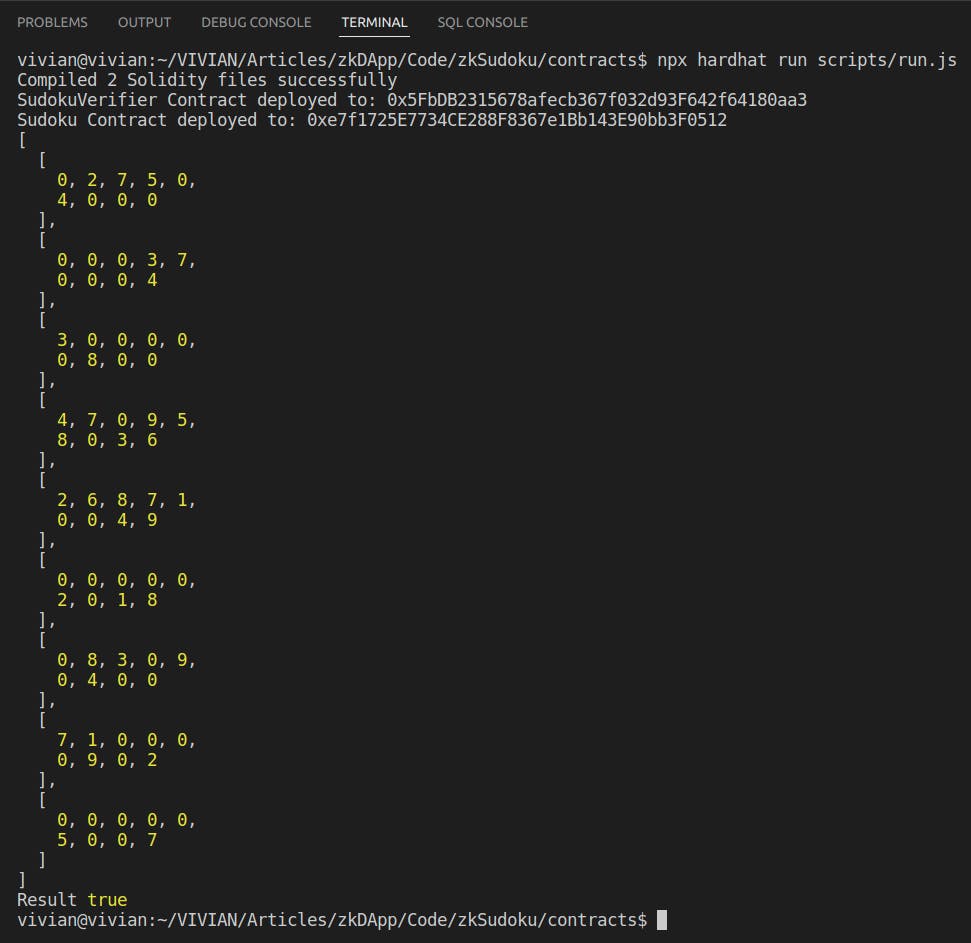
11. Deploy smart contracts
We are going to deploy smart contracts on Sepolia.
We will use Metamask.
Note: You can add the Sepolia network on Metamask by following the Sepolia website and clicking the Add to Metamask button.
- Inside the
scriptsfolder, add adeploy.jsfile and add to it:
const main = async () => {
const SudokuVerifier = await hre.ethers.getContractFactory("SudokuVerifier");
const sudokuVerifier = await SudokuVerifier.deploy();
await sudokuVerifier.deployed();
console.log("SudokuVerifier Contract deployed to:", sudokuVerifier.address);
const Sudoku = await hre.ethers.getContractFactory("Sudoku");
const sudoku = await Sudoku.deploy(sudokuVerifier.address);
await sudoku.deployed();
console.log("Sudoku Contract deployed to:", sudoku.address);
};
const runMain = async () => {
try {
await main();
process.exit(0);
} catch (error) {
console.log(error);
process.exit(1);
}
};
runMain();
Note: It is almost the same as run.js but only deployed smart contracts.
Deploy smart contracts on Sepolia.
Create a
.envfile and add to it:
PRIVATE_KEY=
Note: After the = symbol, add the private key of your wallet. Check that the .env file is in the .gitignore file like this:
node_modules
.env
coverage
coverage.json
typechain
#Hardhat files
cache
artifacts
- Install the dotenv library:
yarn add dotenv
- Go to the
hardhat.config.jsfile and editmodule.exportslike this:
module.exports = {
solidity: {
version: "0.8.4",
settings: {
optimizer: {
enabled: true,
runs: 200,
},
},
},
networks: {
sepolia: {
url: "https://rpc.sepolia.org/",
accounts: [process.env.PRIVATE_KEY],
},
mumbai: {
url: "https://rpc-mumbai.maticvigil.com",
accounts: [process.env.PRIVATE_KEY],
},
},
};
- Go to
hardhat.config.jsand add after the lastrequireat the top:
require("dotenv").config();
- Your
hardhat.config.jsfile should look like this:
require("@nomiclabs/hardhat-waffle");
require("hardhat-gas-reporter");
require("dotenv").config();
// This is a sample Hardhat task. To learn how to create your own go to
// https://hardhat.org/guides/create-task.html
task("accounts", "Prints the list of accounts", async (taskArgs, hre) => {
const accounts = await hre.ethers.getSigners();
for (const account of accounts) {
console.log(account.address);
}
});
// You need to export an object to set up your config
// Go to https://hardhat.org/config/ to learn more
/**
* @type import('hardhat/config').HardhatUserConfig
*/
module.exports = {
solidity: {
version: "0.8.4",
settings: {
optimizer: {
enabled: true,
runs: 200,
},
},
},
networks: {
sepolia: {
url: "https://rpc.sepolia.org/",
accounts: [process.env.PRIVATE_KEY],
},
mumbai: {
url: "https://rpc-mumbai.maticvigil.com",
accounts: [process.env.PRIVATE_KEY],
},
},
};
- Get Sepolia ETH faucet for Testnet:
Go to https://sepoliafaucet.com/ and follow the instructions there.
- Run the
deploy.jsfile:
npx hardhat run scripts/deploy.js --network sepolia

Note: You can see the transactions on the Sepolia Block Explorer: https://sepolia.etherscan.io/
Frontend
12. Creating the application
- Create the Next.js Application.
Open a terminal inside the zkSudoku folder and run:
yarn create next-app zksudoku-ui
- Go inside the
zksudoku-uifolder:
cd zksudoku-ui
- Open a code editor inside the
zksudoku-uifolder.
Note: I use Visual Studio Code. To open Visual Studio Code, run:
code .
- To test that everything is fine let's start the server, run:
yarn dev
Open a browser and go to http://localhost:3000/.
You will see this:

- Stop the server and let's start building the game.
13. Add some libraries
- Add Tailwind to style pages.
Follow the oficial documentation for adding Tailwind in Next.js.
- Add wagmi to comunicate with smart contracts in the frontend:
yarn add wagmi ethers
- Add snarkjs to generate zk proof in the browser:
yarn add snarkjs
Note: Make sure you have the same global and local version of snarkjs.
1- To check the global snarkjs version, open a console and run:
snarkjs -v
You will see something like this:

2- To check the local snarkjs version, go to the package.json file and check the snarkjs version there. You will see something like this:
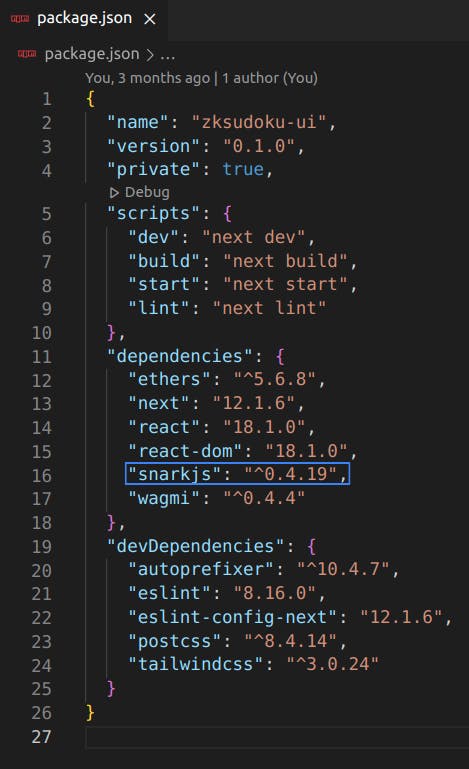
You can see that both versions of snarkjs are the same: 0.4.19.
Two ways you can import snarkjs in the client side:
1- Using the snarkjs.min.js file.
Copy the snarkjs.min.js inside the public folder:
cp ./node_modules/snarkjs/build/snarkjs.min.js ./public
Add <Script id="snarkjs" src="/snarkjs.min.js" /> in layout.js
You can access the library using window.snarkjs.
2- As a package.
To install snarkjs, run:
yarn add snarkjs
Configure webpack in the next.config.js file to use snarkjs:
const nextConfig = {
reactStrictMode: true,
webpack: function (config, options) {
if (!options.isServer) {
config.resolve.fallback.fs = false;
}
config.experiments = { asyncWebAssembly: true };
return config;
},
};
module.exports = nextConfig;
Note: The config.experiments = { asyncWebAssembly: true }; line is for using wasm files.
In this guide, I use snarkjs as a package (way 2).
14. Add some configuration
- To generate the proof, add a
.babelrcfile and add to it:
{
"presets": [
[
"next/babel",
{
"preset-env": {
// "debug": true,
"targets": [
"last 2 Edge versions",
"last 2 Opera versions",
"last 2 Safari versions",
"last 2 Chrome versions",
"last 2 Firefox versions"
]
}
}
]
]
}
15. Add Zero Knowledge in the frontend
Inside the
publicfolder, add azkprooffolder and copy thesudoku.wasmandsudoku_final.keyfiles there:- To copy the
sudoku.wasmfile:
- To copy the
cp ../../circuits/sudoku/sudoku_js/sudoku.wasm ./public/zkproof
- To copy the
sudoku_final.zkeyfile:
cp ../../circuits/sudoku/sudoku_final.zkey ./public/zkproof
- Inside the
zksudoku-uifolder, create azkprooffolder. Inside this new folder created, create thesnarkjsZkproof.jsfile and add to it:
import { groth16 } from "snarkjs";
export async function exportCallDataGroth16(input, wasmPath, zkeyPath) {
const { proof: _proof, publicSignals: _publicSignals } =
await groth16.fullProve(input, wasmPath, zkeyPath);
const calldata = await groth16.exportSolidityCallData(_proof, _publicSignals);
const argv = calldata
.replace(/["[\]\s]/g, "")
.split(",")
.map((x) => BigInt(x).toString());
const a = [argv[0], argv[1]];
const b = [
[argv[2], argv[3]],
[argv[4], argv[5]],
];
const c = [argv[6], argv[7]];
const Input = [];
for (let i = 8; i < argv.length; i++) {
Input.push(argv[i]);
}
return { a, b, c, Input };
}
Note: If you get an error importing groth16 from snarkjs that says:
./node_modules/fastfile/src/fastfile.js
Can't import the named export 'O_TRUNC' (imported as 'O_TRUNC') from default-exporting module (only default export is available)
Then, import groth16 like so:
const groth16 = require("snarkjs").groth16;
Or this way:
const { groth16 } = require("snarkjs");
Note: If you get an error importing groth16 from snarkjs that says:
./node_modules/snarkjs/build/main.cjs:8:0
Module not found: Can't resolve 'readline'
Then, add the config.resolve.fallback.readline = false; line in the next.config.js file like so:
/** @type {import('next').NextConfig} */
const nextConfig = {
reactStrictMode: true,
webpack: function (config, options) {
if (!options.isServer) {
config.resolve.fallback.fs = false;
config.resolve.fallback.readline = false;
}
config.experiments = { asyncWebAssembly: true };
return config;
},
};
module.exports = nextConfig;
- Inside the
zksudoku-ui/zkprooffolder, create thesudokufolder and inside this new folder created, create thesnarkjsSudoku.jsfile and add to it:
import { exportCallDataGroth16 } from "../snarkjsZkproof";
export async function sudokuCalldata(unsolved, solved) {
const input = {
unsolved: unsolved,
solved: solved,
};
let dataResult;
try {
dataResult = await exportCallDataGroth16(
input,
"/zkproof/sudoku.wasm",
"/zkproof/sudoku_final.zkey"
);
} catch (error) {
// console.log(error);
window.alert("Wrong answer");
}
return dataResult;
}
16. Connect to smart contracts to verify the proof
- Code to connect to smart contracts:
const contract = useContract({
addressOrName: contractAddress.sudokuContract,
contractInterface: sudokuContractAbi.abi,
signerOrProvider: signer || provider,
});
- Code to use the
verifySudokufunction which is in theSudokusmart contract:
result = await contract.verifySudoku(
calldata.a,
calldata.b,
calldata.c,
calldata.Input
);
Note: The two code blocks above are inside pages/sudoku.js.
17. Add utility files
Inside the
zksudoku-uifolder add theutilsfolder.Inside the
utilsfolder created, add:The
abiFilesfolder which contains all the abi files needed for the frontend application. You can find the abi file here:zkSudoku/contracts/artifacts/contracts/Sudoku.sol/Sudoku.json. The abi file is a file generated when the smart contract is compiled.The
contractsaddress.jsonfile that contains all the necessary smart contracts addresses, in this case, theSudokucontract:
{
"sudokuContract": "0x74fFA95140FC8bB10A8C9d9bac4E133E0eb628D3"
}
- The
networks.jsonfile which contains all the chains that we can use in the app and theselectedChainwhich is the network used in this project (Sepolia):
{
"selectedChain": "11155111",
"1337": {
"chainId": "1337",
"chainName": "Localhost 8545",
"rpcUrls": ["http://localhost:8545"],
"nativeCurrency": {
"symbol": "ETH"
},
"blockExplorerUrls": []
},
"11155111": {
"chainId": "11155111",
"chainName": "Sepolia",
"rpcUrls": ["https://rpc.sepolia.org"],
"nativeCurrency": {
"symbol": "ETH"
},
"blockExplorerUrls": ["https://sepolia.etherscan.io/"]
},
"80001": {
"chainId": "80001",
"chainName": "Mumbai",
"rpcUrls": ["https://rpc-mumbai.maticvigil.com"],
"nativeCurrency": {
"symbol": "MATIC"
},
"blockExplorerUrls": ["https://mumbai.polygonscan.com/"]
}
}
- The
switchNetwork.jsfile to switch to the network used in the projects if necessary. (In this project we are using Sepolia)
import networks from "../utils/networks.json";
export const switchNetwork = async () => {
if (window.ethereum) {
try {
// Try to switch to the chain
await ethereum.request({
method: "wallet_switchEthereumChain",
params: [
{ chainId: `0x${parseInt(networks.selectedChain).toString(16)}` },
],
});
} catch (switchError) {
// This error code indicates that the chain has not been added to MetaMask.
if (switchError.code === 4902) {
try {
await ethereum.request({
method: "wallet_addEthereumChain",
params: [
{
chainId: `0x${parseInt(networks.selectedChain).toString(16)}`,
chainName: networks[networks.selectedChain].chainName,
rpcUrls: networks[networks.selectedChain].rpcUrls,
nativeCurrency: {
symbol:
networks[networks.selectedChain].nativeCurrency.symbol,
decimals: 18,
},
blockExplorerUrls:
networks[networks.selectedChain].blockExplorerUrls,
},
],
});
} catch (addError) {
console.log(addError);
}
}
// handle other "switch" errors
}
} else {
// If window.ethereum is not found then MetaMask is not installed
alert(
"MetaMask is not installed. Please install it to use this app: https://metamask.io/download/"
);
}
};
18. Add other files
Delete:
The
apifolder inside thepagesfolder.The
favicon.icofile, inside thepublicfolder.The
vercel.svgfile, inside thepublicfolder.
Create:
The
assetsfolder and add the image inside it.The
componentsfolder and copy all the code inside that folder.
Copy:
All the files inside the
pagesfolder.All the files inside the
stylesfolder.The
favicon.icoandsocialMedia.pngfiles, inside thepublicfolder.
19. Deploy the frontend
We are going to deploy the frontend on Vercel.
Create a new Github repository.
Go to Vercel:
Create a new project.
Import the Github repo created before.
Configure the project (select
Next.jsas FRAMEWORK PRESET andzksudoku-uias ROOT DIRECTORY) and clickDeploy:
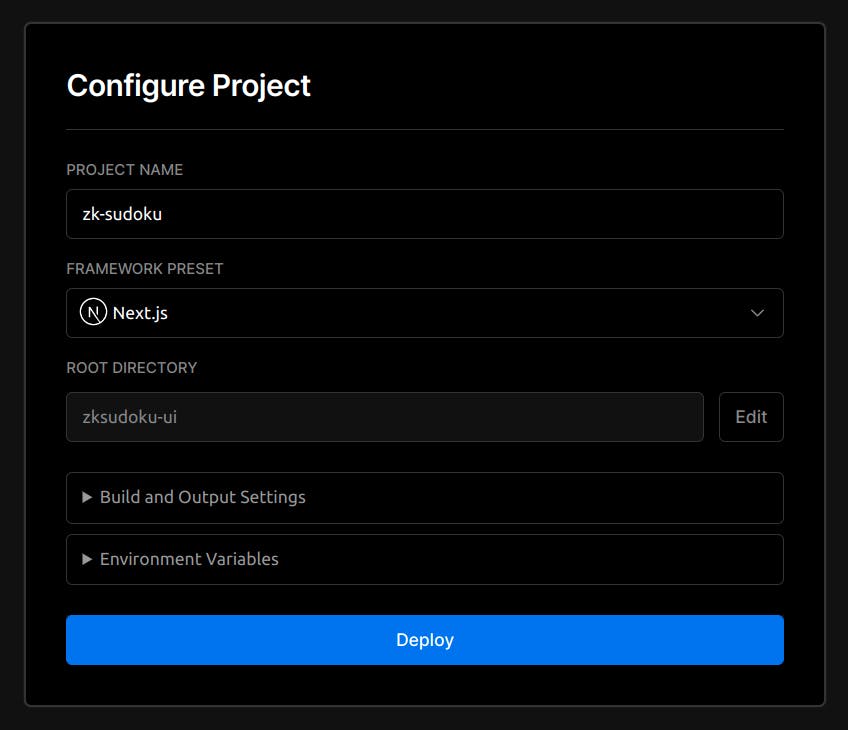
Live app:
Live App Images:
- Initial Page:
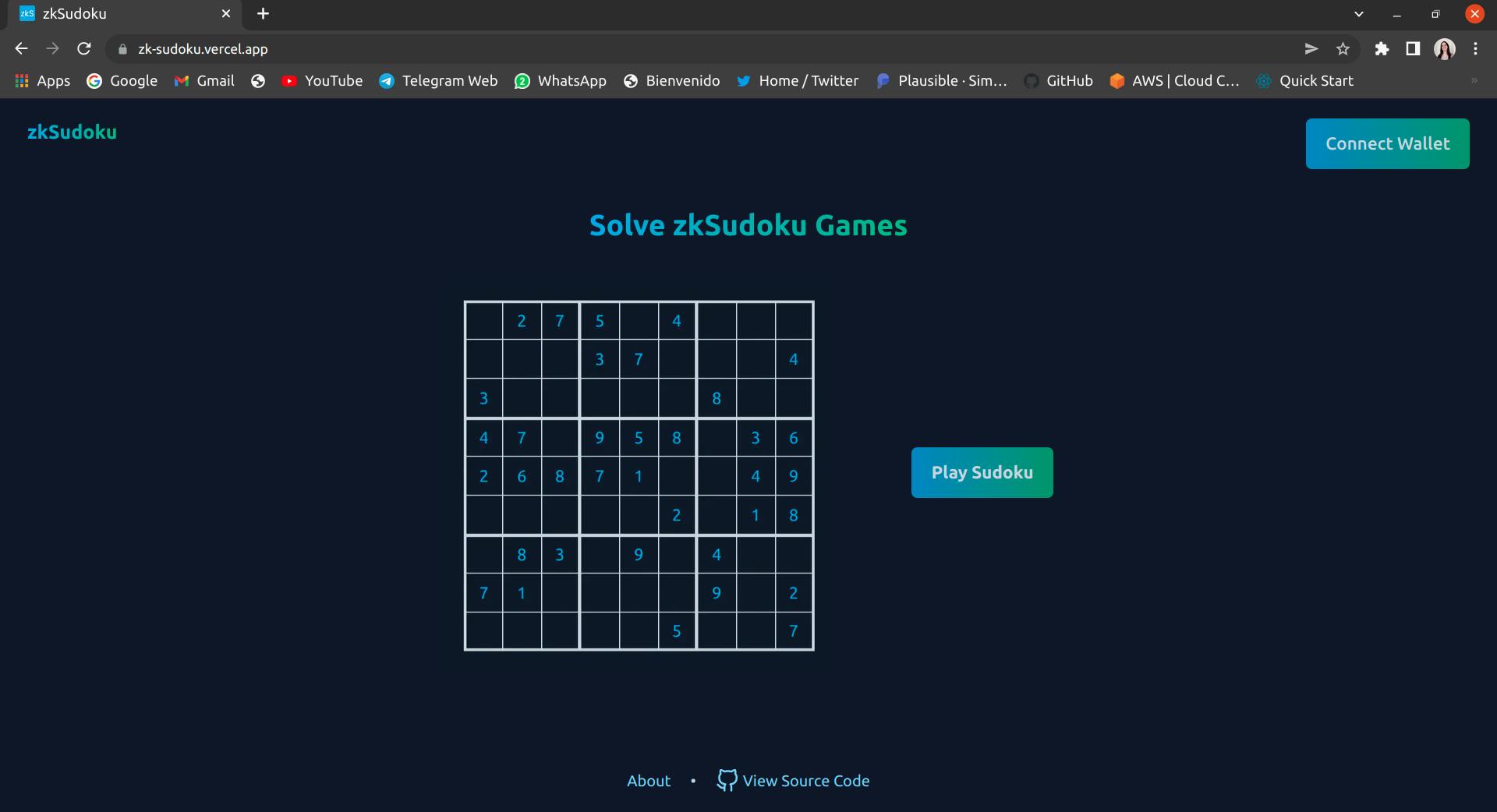
- Wrong answer:
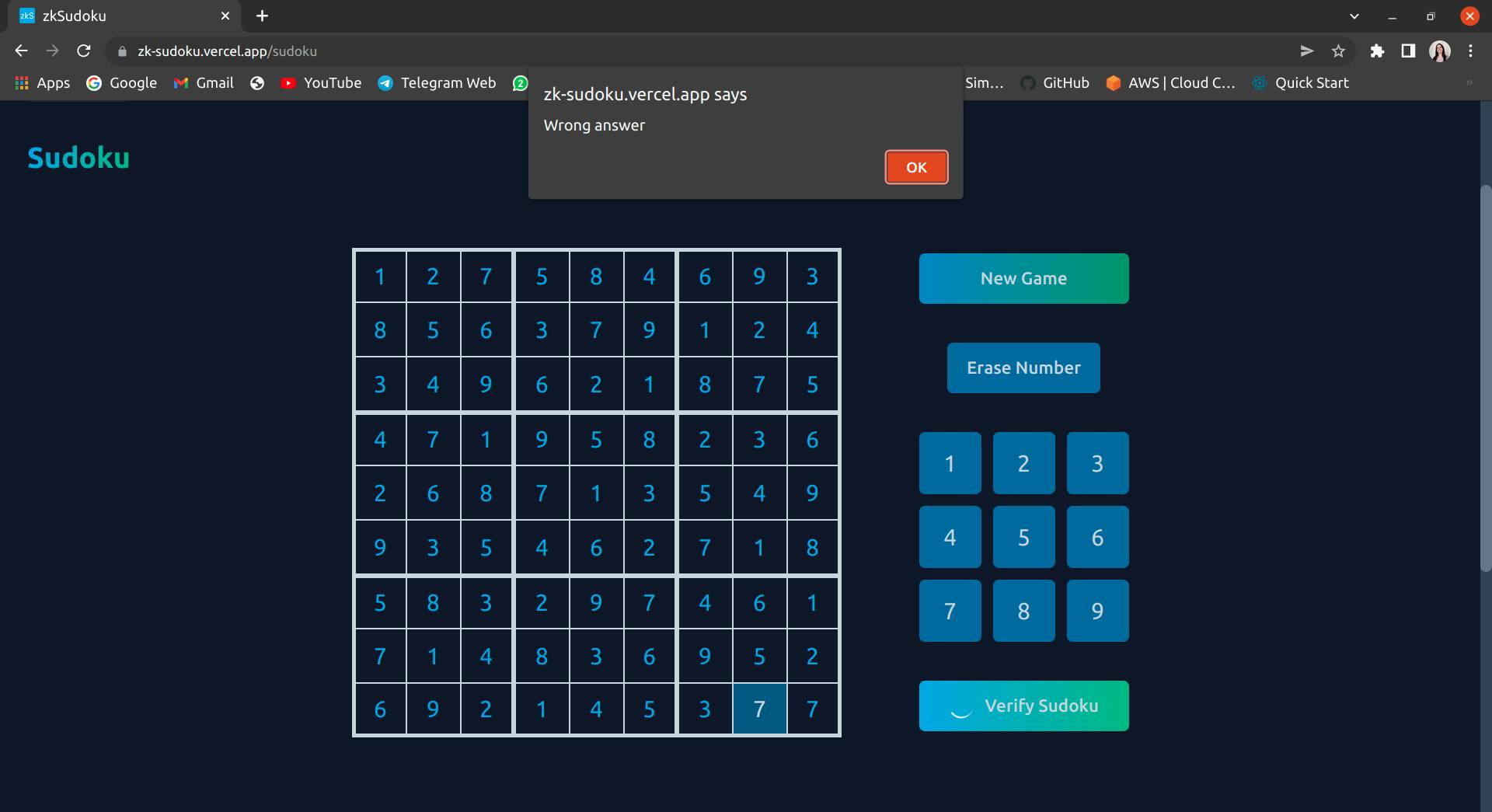
- Successfully verified:
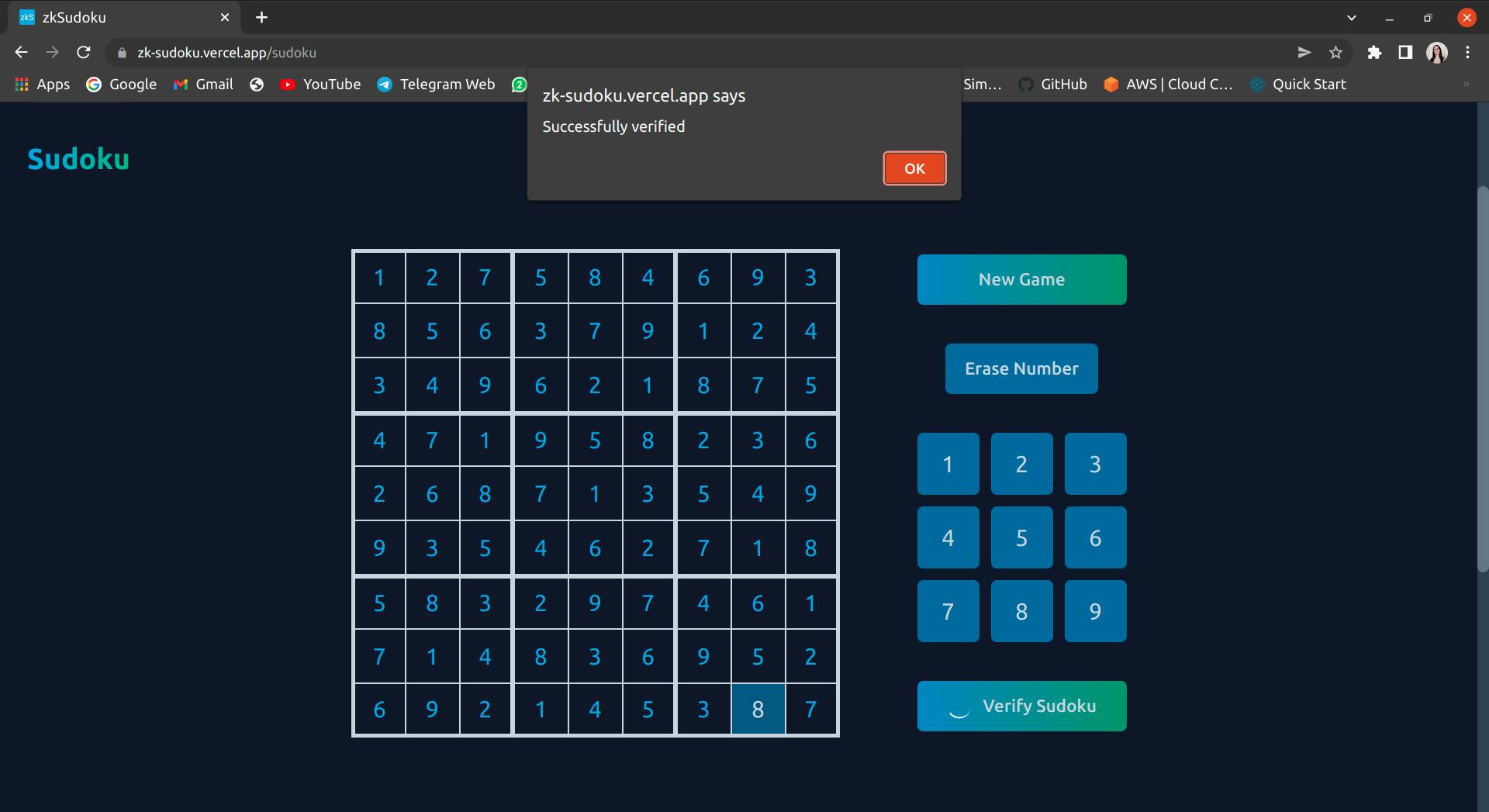
Some Tips
If you change the circuit, you should update:
sudokuVerifier.solinsidecontracts/contracts.sudoku.wasmandsudoku_final/zkeyfiles insidecontracts/zkproof.sudoku.wasmandsudoku_final/zkeyfiles insidezksudoku-ui/public/zkproof.
If you change smart contracts you should update if necessary:
The
Sudoku.jsonabi file insidezkSudoku-ui/utils/abiFiles.The
contractaddress.jsonfile insidezkSudoku-ui/utils/(with the new Sudoku smart contract address in case smart contracts are deployed again).
If you change the network used to deploy you should update
selectedChaininsidezkSudoku-ui/utils/networks.json.To copy or update all the zk elements to use and test smart contracts, you can create the
copyZkFiles.shfile insidezkSudoku/contracts/contracts/scriptsand add to it:
#!/bin/bash
# Copy the verifier
cp ../circuits/sudoku/sudokuVerifier.sol contracts
# Create the zkproof folder if it does not exist
mkdir -p zkproof
# Copy the wasm file to test smart contracts
cp ../circuits/sudoku/sudoku_js/sudoku.wasm zkproof
# Copy the final zkey file to test smart contracts
cp ../circuits/sudoku/sudoku_final.zkey zkproof
Run the first time:
chmod u+x scripts/copyZkFiles.sh
And after that, you can always run:
./scripts/copyZkFiles.sh
- To copy or update all the zk elements to use in the frontend, you can create the
copyZkFiles.shfile insidezkSudoku/zkSudoku-ui/scriptsand add to it:
#!/bin/bash
# Create the zkproof folder inside the public folder if it does not exist
mkdir -p public/zkproof
# Copy the wasm file
cp ../circuits/sudoku/sudoku_js/sudoku.wasm public/zkproof
# Copy the final zkey
cp ../circuits/sudoku/sudoku_final.zkey public/zkproof
# Create the abiFiles folder inside the utils folder if it does not exist
mkdir -p utils/abiFiles
# Copy the abi file
cp ../contracts/artifacts/contracts/Sudoku.sol/Sudoku.json utils/abiFiles
Run the first time:
chmod u+x scripts/copyZkFiles.sh
And after that, you can always run:
./scripts/copyZkFiles.sh
Create a zk dapp using Plonk instead of Groth16
To create a zk dapp using Plonk instead of Groth16, you can follow the same steps before but changing some files in some steps.
Circuits changes
- We are not going to use Groth16, so instead of
executeGoth16.sh, let's add aexecutePlonk.shfile and add to it:
#!/bin/bash
# Variable to store the name of the circuit
CIRCUIT=sudoku
# Variable to store the number of the ptau file
PTAU=15
# In case there is a circuit name as an input
if [ "$1" ]; then
CIRCUIT=$1
fi
# In case there is a ptau file number as an input
if [ "$2" ]; then
PTAU=$2
fi
# Check if the necessary ptau file already exists. If it does not exist, it will be downloaded from the data center
if [ -f ./ptau/powersOfTau28_hez_final_${PTAU}.ptau ]; then
echo "----- powersOfTau28_hez_final_${PTAU}.ptau already exists -----"
else
echo "----- Download powersOfTau28_hez_final_${PTAU}.ptau -----"
wget -P ./ptau https://hermez.s3-eu-west-1.amazonaws.com/powersOfTau28_hez_final_${PTAU}.ptau
fi
# Compile the circuit
circom ${CIRCUIT}.circom --r1cs --wasm --sym --c
# Generate the witness.wtns
node ${CIRCUIT}_js/generate_witness.js ${CIRCUIT}_js/${CIRCUIT}.wasm input.json ${CIRCUIT}_js/witness.wtns
echo "----- Generate .zkey file -----"
# Generate a .zkey file that will contain the proving and verification keys together with all phase 2 contributions
snarkjs plonk setup ${CIRCUIT}.r1cs ptau/powersOfTau28_hez_final_${PTAU}.ptau ${CIRCUIT}_final.zkey
echo "----- Export the verification key -----"
# Export the verification key
snarkjs zkey export verificationkey ${CIRCUIT}_final.zkey verification_key.json
echo "----- Generate zk-proof -----"
# Generate a zk-proof associated to the circuit and the witness. This generates proof.json and public.json
snarkjs plonk prove ${CIRCUIT}_final.zkey ${CIRCUIT}_js/witness.wtns proof.json public.json
echo "----- Verify the proof -----"
# Verify the proof
snarkjs plonk verify verification_key.json public.json proof.json
echo "----- Generate Solidity verifier -----"
# Generate a Solidity verifier that allows verifying proofs on Ethereum blockchain
snarkjs zkey export solidityverifier ${CIRCUIT}_final.zkey ${CIRCUIT}PlonkVerifier.sol
# Update the solidity version in the Solidity verifier
sed -i "s/>=0.7.0 <0.9.0;/^0.8.4;/g" ${CIRCUIT}PlonkVerifier.sol
# Update the contract name in the Solidity verifier
sed -i "s/contract PlonkVerifier/contract SudokuPlonkVerifier/g" ${CIRCUIT}PlonkVerifier.sol
echo "----- Generate and print parameters of call -----"
# Generate and print parameters of call
snarkjs generatecall | tee parameters.txt
When you run the above executePlonk.sh file you will see:
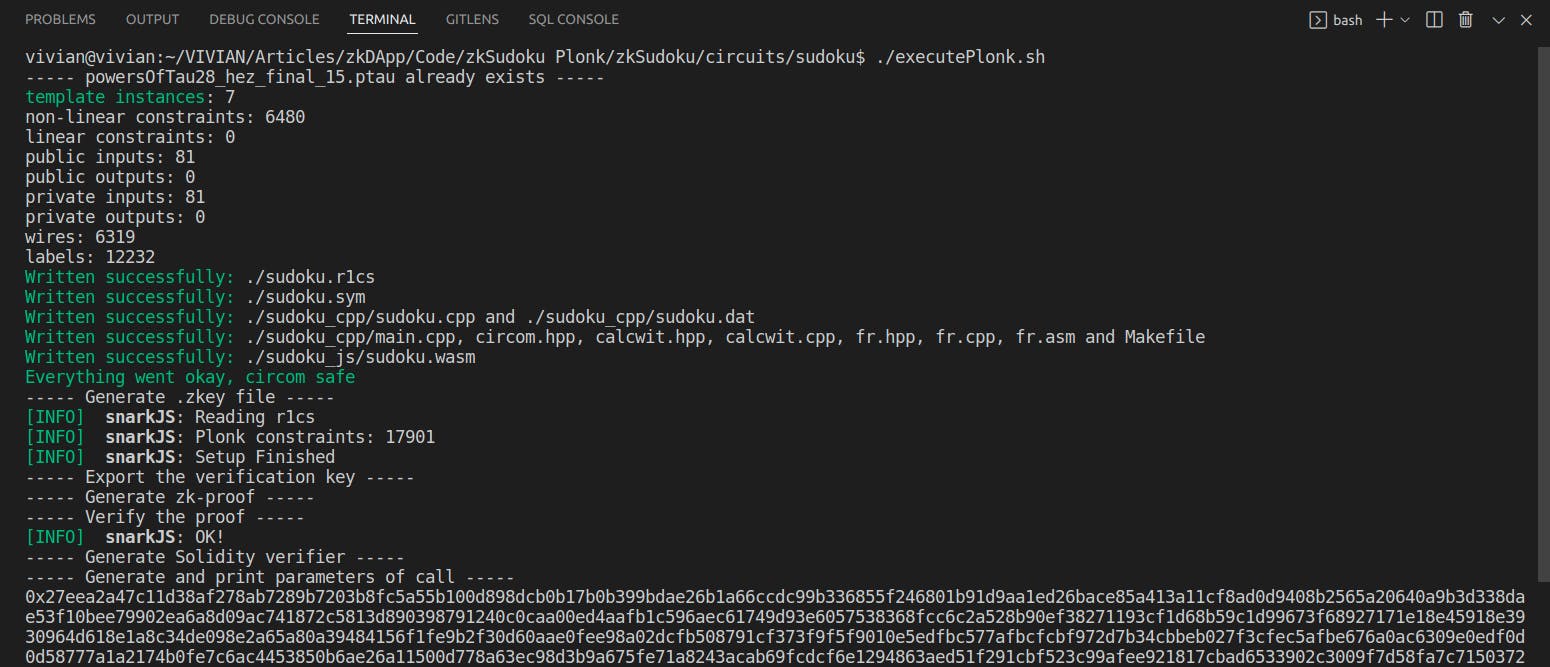
Here we needed the powersOfTau28_hez_final_15.ptau instead of powersOfTau28_hez_final_14.ptau (as we used with Groth16) because the amount of Plonk constraints is 17901 and it is > 2**14.
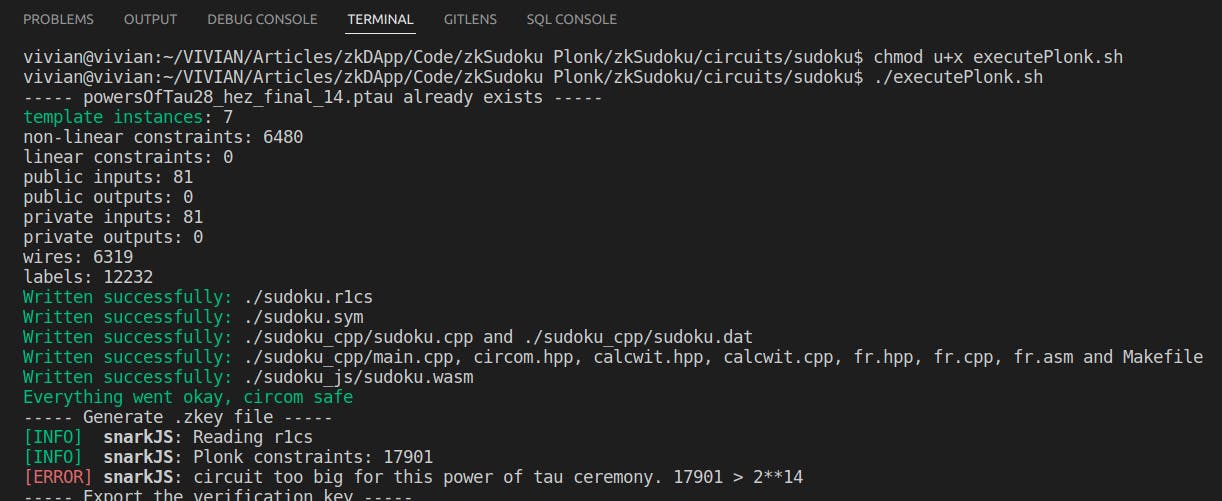
Smart Contracts changes
- The
Sudoku.solfile changes a little because theIVerifierinterface uses different input because ofverifyProof(bytes memory proof, uint[] memory pubSignals)inside the generatedsudokuPlonkVerifier.sol:
//SPDX-License-Identifier: Unlicense
pragma solidity ^0.8.4;
interface IVerifier {
function verifyProof(bytes memory proof, uint256[] memory pubSignals)
external
view
returns (bool);
}
contract Sudoku {
address public verifierAddr;
uint8[9][9][3] sudokuBoardList = [
[
[1, 2, 7, 5, 8, 4, 6, 9, 3],
[8, 5, 6, 3, 7, 9, 1, 2, 4],
[3, 4, 9, 6, 2, 1, 8, 7, 5],
[4, 7, 1, 9, 5, 8, 2, 3, 6],
[2, 6, 8, 7, 1, 3, 5, 4, 9],
[9, 3, 5, 4, 6, 2, 7, 1, 8],
[5, 8, 3, 2, 9, 7, 4, 6, 1],
[7, 1, 4, 8, 3, 6, 9, 5, 2],
[6, 9, 2, 1, 4, 5, 3, 0, 7]
],
[
[0, 2, 7, 5, 0, 4, 0, 0, 0],
[0, 0, 0, 3, 7, 0, 0, 0, 4],
[3, 0, 0, 0, 0, 0, 8, 0, 0],
[4, 7, 0, 9, 5, 8, 0, 3, 6],
[2, 6, 8, 7, 1, 0, 0, 4, 9],
[0, 0, 0, 0, 0, 2, 0, 1, 8],
[0, 8, 3, 0, 9, 0, 4, 0, 0],
[7, 1, 0, 0, 0, 0, 9, 0, 2],
[0, 0, 0, 0, 0, 5, 0, 0, 7]
],
[
[0, 0, 0, 0, 0, 6, 0, 0, 0],
[0, 0, 7, 2, 0, 0, 8, 0, 0],
[9, 0, 6, 8, 0, 0, 0, 1, 0],
[3, 0, 0, 7, 0, 0, 0, 2, 9],
[0, 0, 0, 0, 0, 0, 0, 0, 0],
[4, 0, 0, 5, 0, 0, 0, 7, 0],
[6, 5, 0, 1, 0, 0, 0, 0, 0],
[8, 0, 1, 0, 5, 0, 3, 0, 0],
[7, 9, 2, 0, 0, 0, 0, 0, 4]
]
];
constructor(address _verifierAddr) {
verifierAddr = _verifierAddr;
}
function verifyProof(bytes memory proof, uint256[] memory pubSignals)
public
view
returns (bool)
{
return IVerifier(verifierAddr).verifyProof(proof, pubSignals);
}
function verifySudokuBoard(uint256[] memory board)
private
view
returns (bool)
{
bool isEqual = true;
for (uint256 i = 0; i < sudokuBoardList.length; ++i) {
isEqual = true;
for (uint256 j = 0; j < sudokuBoardList[i].length; ++j) {
for (uint256 k = 0; k < sudokuBoardList[i][j].length; ++k) {
if (board[9 * j + k] != sudokuBoardList[i][j][k]) {
isEqual = false;
break;
}
}
}
if (isEqual == true) {
return isEqual;
}
}
return isEqual;
}
function verifySudoku(bytes memory proof, uint256[] memory pubSignals)
public
view
returns (bool)
{
require(verifySudokuBoard(pubSignals), "This board does not exist");
require(verifyProof(proof, pubSignals), "Filed proof check");
return true;
}
function pickRandomBoard(string memory stringTime)
private
view
returns (uint8[9][9] memory)
{
uint256 randPosition = uint256(
keccak256(
abi.encodePacked(
block.difficulty,
block.timestamp,
msg.sender,
stringTime
)
)
) % sudokuBoardList.length;
return sudokuBoardList[randPosition];
}
function generateSudokuBoard(string memory stringTime)
public
view
returns (uint8[9][9] memory)
{
return pickRandomBoard(stringTime);
}
}
- The
copyZkFiles.shchanges because the verifier was calledsudokuPlonkVerifier:
#!/bin/bash
# Copy the verifier
cp ../circuits/sudoku/sudokuPlonkVerifier.sol contracts
# Create the zkproof folder if it does not exist
mkdir -p zkproof
# Copy the wasm file to test smart contracts
cp ../circuits/sudoku/sudoku_js/sudoku.wasm zkproof
# Copy the final zkey file to test smart contracts
cp ../circuits/sudoku/sudoku_final.zkey zkproof
- Change the
utils.jsfile insidetest/utilsfolder:
const { plonk } = require("snarkjs");
async function exportCallDataPlonk(input, wasmPath, zkeyPath) {
const { proof: _proof, publicSignals: _publicSignals } =
await plonk.fullProve(input, wasmPath, zkeyPath);
const calldata = await plonk.exportSolidityCallData(_proof, _publicSignals);
// console.log("calldata", calldata);
const calldataSplit = calldata.split(",");
const [proof, ...rest] = calldataSplit;
const publicSignals = JSON.parse(rest.join(",")).map((x) =>
BigInt(x).toString()
);
return { proof, publicSignals };
}
module.exports = {
exportCallDataPlonk,
};
- Change the
test.jsfile inside thetestfolder:
const { expect } = require("chai");
const { ethers } = require("hardhat");
const { exportCallDataPlonk } = require("./utils/utils");
describe("Sudoku", function () {
let SudokuPlonkVerifier, sudokuPlonkVerifier, Sudoku, sudoku;
before(async function () {
SudokuPlonkVerifier = await ethers.getContractFactory(
"SudokuPlonkVerifier"
);
sudokuPlonkVerifier = await SudokuPlonkVerifier.deploy();
await sudokuPlonkVerifier.deployed();
Sudoku = await ethers.getContractFactory("Sudoku");
sudoku = await Sudoku.deploy(sudokuPlonkVerifier.address);
await sudoku.deployed();
});
it("Should generate a board", async function () {
let board = await sudoku.generateSudokuBoard(new Date().toString());
expect(board.length).to.equal(9);
});
it("Should return true for valid proof on-chain", async function () {
this.timeout(50000);
const unsolved = [
[1, 2, 7, 5, 8, 4, 6, 9, 3],
[8, 5, 6, 3, 7, 9, 1, 2, 4],
[3, 4, 9, 6, 2, 1, 8, 7, 5],
[4, 7, 1, 9, 5, 8, 2, 3, 6],
[2, 6, 8, 7, 1, 3, 5, 4, 9],
[9, 3, 5, 4, 6, 2, 7, 1, 8],
[5, 8, 3, 2, 9, 7, 4, 6, 1],
[7, 1, 4, 8, 3, 6, 9, 5, 2],
[6, 9, 2, 1, 4, 5, 3, 0, 7],
];
const solved = [
[1, 2, 7, 5, 8, 4, 6, 9, 3],
[8, 5, 6, 3, 7, 9, 1, 2, 4],
[3, 4, 9, 6, 2, 1, 8, 7, 5],
[4, 7, 1, 9, 5, 8, 2, 3, 6],
[2, 6, 8, 7, 1, 3, 5, 4, 9],
[9, 3, 5, 4, 6, 2, 7, 1, 8],
[5, 8, 3, 2, 9, 7, 4, 6, 1],
[7, 1, 4, 8, 3, 6, 9, 5, 2],
[6, 9, 2, 1, 4, 5, 3, 8, 7],
];
const input = {
unsolved: unsolved,
solved: solved,
};
let dataResult = await exportCallDataPlonk(
input,
"./zkproof/sudoku.wasm",
"./zkproof/sudoku_final.zkey"
);
// Call the function.
let result = await sudokuPlonkVerifier.verifyProof(
dataResult.proof,
dataResult.publicSignals
);
expect(result).to.equal(true);
});
it("Should return false for invalid proof on-chain", async function () {
let proof = 0;
let publicSignals = new Array(81).fill(0);
let dataResult = { proof, publicSignals };
// Call the function.
let result = await sudokuPlonkVerifier.verifyProof(
dataResult.proof,
dataResult.publicSignals
);
expect(result).to.equal(false);
});
it("Should verify Sudoku successfully", async function () {
this.timeout(50000);
const unsolved = [
[1, 2, 7, 5, 8, 4, 6, 9, 3],
[8, 5, 6, 3, 7, 9, 1, 2, 4],
[3, 4, 9, 6, 2, 1, 8, 7, 5],
[4, 7, 1, 9, 5, 8, 2, 3, 6],
[2, 6, 8, 7, 1, 3, 5, 4, 9],
[9, 3, 5, 4, 6, 2, 7, 1, 8],
[5, 8, 3, 2, 9, 7, 4, 6, 1],
[7, 1, 4, 8, 3, 6, 9, 5, 2],
[6, 9, 2, 1, 4, 5, 3, 0, 7],
];
const solved = [
[1, 2, 7, 5, 8, 4, 6, 9, 3],
[8, 5, 6, 3, 7, 9, 1, 2, 4],
[3, 4, 9, 6, 2, 1, 8, 7, 5],
[4, 7, 1, 9, 5, 8, 2, 3, 6],
[2, 6, 8, 7, 1, 3, 5, 4, 9],
[9, 3, 5, 4, 6, 2, 7, 1, 8],
[5, 8, 3, 2, 9, 7, 4, 6, 1],
[7, 1, 4, 8, 3, 6, 9, 5, 2],
[6, 9, 2, 1, 4, 5, 3, 8, 7],
];
const input = {
unsolved: unsolved,
solved: solved,
};
let dataResult = await exportCallDataPlonk(
input,
"./zkproof/sudoku.wasm",
"./zkproof/sudoku_final.zkey"
);
// Call the function.
let result = await sudoku.verifySudoku(
dataResult.proof,
dataResult.publicSignals
);
expect(result).to.equal(true);
});
it("Should be reverted on Sudoku verification because the board is not in the board list", async function () {
this.timeout(50000);
const unsolved = [
[1, 2, 7, 5, 8, 4, 6, 9, 3],
[8, 5, 6, 3, 7, 9, 1, 2, 4],
[3, 4, 9, 6, 2, 1, 8, 7, 5],
[4, 7, 1, 9, 5, 8, 2, 3, 6],
[2, 6, 8, 7, 1, 3, 5, 4, 9],
[9, 3, 5, 4, 6, 2, 7, 1, 8],
[5, 8, 3, 2, 9, 7, 4, 6, 1],
[7, 1, 4, 8, 3, 6, 9, 5, 2],
[6, 9, 2, 1, 4, 5, 3, 8, 0],
];
const solved = [
[1, 2, 7, 5, 8, 4, 6, 9, 3],
[8, 5, 6, 3, 7, 9, 1, 2, 4],
[3, 4, 9, 6, 2, 1, 8, 7, 5],
[4, 7, 1, 9, 5, 8, 2, 3, 6],
[2, 6, 8, 7, 1, 3, 5, 4, 9],
[9, 3, 5, 4, 6, 2, 7, 1, 8],
[5, 8, 3, 2, 9, 7, 4, 6, 1],
[7, 1, 4, 8, 3, 6, 9, 5, 2],
[6, 9, 2, 1, 4, 5, 3, 8, 7],
];
const input = {
unsolved: unsolved,
solved: solved,
};
let dataResult = await exportCallDataPlonk(
input,
"./zkproof/sudoku.wasm",
"./zkproof/sudoku_final.zkey"
);
await expect(
sudoku.verifySudoku(dataResult.proof, dataResult.publicSignals)
).to.be.reverted;
});
});
When you run tests you will see something like this:
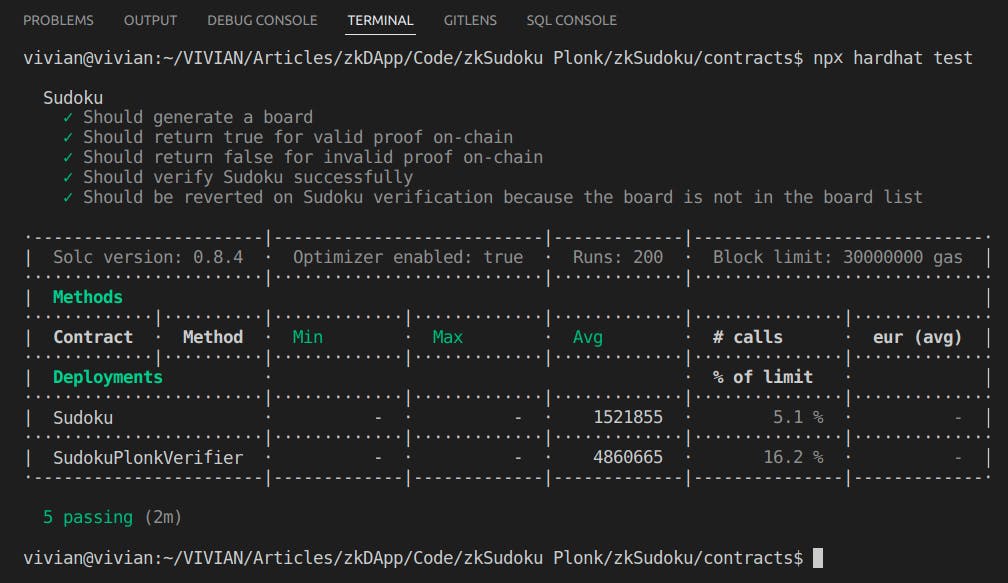
- Change the
run.jsfile inside thescriptsfolder:
const main = async () => {
const SudokuPlonkVerifier = await hre.ethers.getContractFactory(
"SudokuPlonkVerifier"
);
const sudokuPlonkVerifier = await SudokuPlonkVerifier.deploy();
await sudokuPlonkVerifier.deployed();
console.log(
"SudokuPlonkVerifier Contract deployed to:",
sudokuPlonkVerifier.address
);
const Sudoku = await hre.ethers.getContractFactory("Sudoku");
const sudoku = await Sudoku.deploy(sudokuPlonkVerifier.address);
await sudoku.deployed();
console.log("Sudoku Contract deployed to:", sudoku.address);
let board = await sudoku.generateSudokuBoard(new Date().toString());
console.log(board);
let callDataSudoku = [
"0x0cad11bcba4c82b09bad0720b4693782c443a2aee8e43b94ee7e83850dfea8b8094e422b5d68885e47f861e1ec7b60aff4c55268c45d8877afbd6b013e1a8989003b1634d339cb68c50521c250e3163c8ab870a3c232391e992fcec05ffd83650df9a701ade0b1c24c98d727c6d9ebe82bf33e89aaf7b63df9b32616b1756762151ee918cb6e3806f8506ab0b846f0e92e534ea61bf6eed851c3f28d93577448048be778315a418d7d48fe8fd5dec7697cf2a823c720451f58a12ce0fd522d3524fa7ea8fe71a6613f6ac5d7cec371fc9c29bc8e9694f7b0901dad738299cfaf1c753b100e9e614c4811be8c6495cbf6680daee844eac6569d26d30adb92975800f8cc20a55ba04162e162edea8796aab4e3918d797a3cb6960519bfbf7923be2346b0d2eae99719055b79f6732da552b3e8ec4affbfece89ca14d5640b19de825331e9ed347a6e1ce332a3c228a12e252abc465d018fb03748bf79fffd66f34208a692360905da629e9208246b99101d058d1c18fcf857ce9d1d0e686758f6b13088d4592a6915088cf7e524bf04df33a3310ac21bb856db711ef1cbc9a4fd82f58b4173d1b4312d1961bd11903b9ce53d1193f9b853cffe7b5701e6c1ddb3a30318f2ef1cb24add238e060988a7f42c5ec2719fdc72582529a1896cff1f22c073d033632137411aa5b2e50fb61f5baf865e09c55abc7502207ac3514a328ac109e4bd2ab7c9532932c685eea64ed7ca96015c898b10c9b9daa4ab50a6c0ba228501e4ac8bdf49cbaf1a3f1a3236f7c0525914f41528be1fe37c1851d02310a148df09f19bcace7d5b4893326c3b4385b50e417400cd17be1d71ac50224fd79078f558eedbc0b807179f3a68308da86f0c06c58db4e6102c76b4a6138460b690576fc6285a2514fd31673b1bfe8203693424e4523937c0c2c4830ec5b07ee302e39a8d46482f2cbb1b55073ca8f1d9daa05b6028c00461396906a400a99590725f323766c368dce2bb783d5430d4cc71fe2335eb9271e47bd99401248757570228d714d3d6ef977d3658c77a34ebb83b485368f8785ef909bd9b00172cea59d2086f4b69c8e6cf04e6111ba420f8d676d0b4273f150332b09dc28164a5429e1",
[
"0x0000000000000000000000000000000000000000000000000000000000000000",
"0x0000000000000000000000000000000000000000000000000000000000000000",
"0x0000000000000000000000000000000000000000000000000000000000000000",
"0x0000000000000000000000000000000000000000000000000000000000000000",
"0x0000000000000000000000000000000000000000000000000000000000000000",
"0x0000000000000000000000000000000000000000000000000000000000000006",
"0x0000000000000000000000000000000000000000000000000000000000000000",
"0x0000000000000000000000000000000000000000000000000000000000000000",
"0x0000000000000000000000000000000000000000000000000000000000000000",
"0x0000000000000000000000000000000000000000000000000000000000000000",
"0x0000000000000000000000000000000000000000000000000000000000000000",
"0x0000000000000000000000000000000000000000000000000000000000000007",
"0x0000000000000000000000000000000000000000000000000000000000000002",
"0x0000000000000000000000000000000000000000000000000000000000000000",
"0x0000000000000000000000000000000000000000000000000000000000000000",
"0x0000000000000000000000000000000000000000000000000000000000000008",
"0x0000000000000000000000000000000000000000000000000000000000000000",
"0x0000000000000000000000000000000000000000000000000000000000000000",
"0x0000000000000000000000000000000000000000000000000000000000000009",
"0x0000000000000000000000000000000000000000000000000000000000000000",
"0x0000000000000000000000000000000000000000000000000000000000000006",
"0x0000000000000000000000000000000000000000000000000000000000000008",
"0x0000000000000000000000000000000000000000000000000000000000000000",
"0x0000000000000000000000000000000000000000000000000000000000000000",
"0x0000000000000000000000000000000000000000000000000000000000000000",
"0x0000000000000000000000000000000000000000000000000000000000000001",
"0x0000000000000000000000000000000000000000000000000000000000000000",
"0x0000000000000000000000000000000000000000000000000000000000000003",
"0x0000000000000000000000000000000000000000000000000000000000000000",
"0x0000000000000000000000000000000000000000000000000000000000000000",
"0x0000000000000000000000000000000000000000000000000000000000000007",
"0x0000000000000000000000000000000000000000000000000000000000000000",
"0x0000000000000000000000000000000000000000000000000000000000000000",
"0x0000000000000000000000000000000000000000000000000000000000000000",
"0x0000000000000000000000000000000000000000000000000000000000000002",
"0x0000000000000000000000000000000000000000000000000000000000000009",
"0x0000000000000000000000000000000000000000000000000000000000000000",
"0x0000000000000000000000000000000000000000000000000000000000000000",
"0x0000000000000000000000000000000000000000000000000000000000000000",
"0x0000000000000000000000000000000000000000000000000000000000000000",
"0x0000000000000000000000000000000000000000000000000000000000000000",
"0x0000000000000000000000000000000000000000000000000000000000000000",
"0x0000000000000000000000000000000000000000000000000000000000000000",
"0x0000000000000000000000000000000000000000000000000000000000000000",
"0x0000000000000000000000000000000000000000000000000000000000000000",
"0x0000000000000000000000000000000000000000000000000000000000000004",
"0x0000000000000000000000000000000000000000000000000000000000000000",
"0x0000000000000000000000000000000000000000000000000000000000000000",
"0x0000000000000000000000000000000000000000000000000000000000000005",
"0x0000000000000000000000000000000000000000000000000000000000000000",
"0x0000000000000000000000000000000000000000000000000000000000000000",
"0x0000000000000000000000000000000000000000000000000000000000000000",
"0x0000000000000000000000000000000000000000000000000000000000000007",
"0x0000000000000000000000000000000000000000000000000000000000000000",
"0x0000000000000000000000000000000000000000000000000000000000000006",
"0x0000000000000000000000000000000000000000000000000000000000000005",
"0x0000000000000000000000000000000000000000000000000000000000000000",
"0x0000000000000000000000000000000000000000000000000000000000000001",
"0x0000000000000000000000000000000000000000000000000000000000000000",
"0x0000000000000000000000000000000000000000000000000000000000000000",
"0x0000000000000000000000000000000000000000000000000000000000000000",
"0x0000000000000000000000000000000000000000000000000000000000000000",
"0x0000000000000000000000000000000000000000000000000000000000000000",
"0x0000000000000000000000000000000000000000000000000000000000000008",
"0x0000000000000000000000000000000000000000000000000000000000000000",
"0x0000000000000000000000000000000000000000000000000000000000000001",
"0x0000000000000000000000000000000000000000000000000000000000000000",
"0x0000000000000000000000000000000000000000000000000000000000000005",
"0x0000000000000000000000000000000000000000000000000000000000000000",
"0x0000000000000000000000000000000000000000000000000000000000000003",
"0x0000000000000000000000000000000000000000000000000000000000000000",
"0x0000000000000000000000000000000000000000000000000000000000000000",
"0x0000000000000000000000000000000000000000000000000000000000000007",
"0x0000000000000000000000000000000000000000000000000000000000000009",
"0x0000000000000000000000000000000000000000000000000000000000000002",
"0x0000000000000000000000000000000000000000000000000000000000000000",
"0x0000000000000000000000000000000000000000000000000000000000000000",
"0x0000000000000000000000000000000000000000000000000000000000000000",
"0x0000000000000000000000000000000000000000000000000000000000000000",
"0x0000000000000000000000000000000000000000000000000000000000000000",
"0x0000000000000000000000000000000000000000000000000000000000000004",
],
];
// Call the function.
let result = await sudokuPlonkVerifier.verifyProof(
callDataSudoku[0],
callDataSudoku[1]
);
console.log("Result", result);
};
const runMain = async () => {
try {
await main();
process.exit(0);
} catch (error) {
console.log(error);
process.exit(1);
}
};
runMain();
- Change the
deploy.jsfile inside thescriptsfolder:
const main = async () => {
const SudokuPlonkVerifier = await hre.ethers.getContractFactory(
"SudokuPlonkVerifier"
);
const sudokuPlonkVerifier = await SudokuPlonkVerifier.deploy();
await sudokuPlonkVerifier.deployed();
console.log(
"SudokuPlonkVerifier Contract deployed to:",
sudokuPlonkVerifier.address
);
const Sudoku = await hre.ethers.getContractFactory("Sudoku");
const sudoku = await Sudoku.deploy(sudokuPlonkVerifier.address);
await sudoku.deployed();
console.log("Sudoku Contract deployed to:", sudoku.address);
};
const runMain = async () => {
try {
await main();
process.exit(0);
} catch (error) {
console.log(error);
process.exit(1);
}
};
runMain();
Frontend changes
- In the
sudoku.jsfile, insidezksdoku-ui/pages, change each time thecontract.verifySudokufunction is called:
result = await contract.verifySudoku(calldata.proof, calldata.publicSignals);
- Change
snarkjsZkproof.js, insidezksudoku-ui/zkproofto use Plonk:
import { plonk } from "snarkjs";
export async function exportCallDataPlonk(input, wasmPath, zkeyPath) {
const { proof: _proof, publicSignals: _publicSignals } =
await plonk.fullProve(input, wasmPath, zkeyPath);
const calldata = await plonk.exportSolidityCallData(_proof, _publicSignals);
console.log("calldata", calldata);
const calldataSplit = calldata.split(",");
const [proof, ...rest] = calldataSplit;
const publicSignals = JSON.parse(rest.join(",")).map((x) =>
BigInt(x).toString()
);
return { proof, publicSignals };
}
Note: If you get an error importing plonk from snarkjs that says:
./node_modules/fastfile/src/fastfile.js
Can't import the named export 'O_TRUNC' (imported as 'O_TRUNC') from default-exporting module (only default export is available)
Then, import plonk like so:
const plonk = require("snarkjs").plonk;
Or this way:
const { plonk } = require("snarkjs");
- Change the
snarkjsSudoku.jsfile insidezksudoku-ui/zkproof/sudokuto use theexportCallDataPlonkfunction:
import { exportCallDataPlonk } from "../snarkjsZkproof";
export async function sudokuCalldata(unsolved, solved) {
const input = {
unsolved: unsolved,
solved: solved,
};
let dataResult;
try {
dataResult = await exportCallDataPlonk(
input,
"/zkproof/sudoku.wasm",
"/zkproof/sudoku_final.zkey"
);
} catch (error) {
console.log(error);
window.alert("Wrong answer");
}
return dataResult;
}
- Using Plonk, you can see that the
sudoku_final.zkeyfile is about 470 MB. You can add this file to.gitignorein case you do not want to commit it because of the size.
Zero Knowledge Structure
The following graphic shows the structure of the most important zero knowledge elements of the zkSudoku project.
├── circuits
│ ├── sudoku
│ │ ├── sudoku.circom
├── contracts
│ ├── contracts
│ │ ├── Sudoku.sol
│ │ ├── sudokuVerifier.sol
├── zksudoku-ui
│ ├── public
│ │ ├── zkproof
│ │ │ ├── sudoku.wasm
│ │ │ ├── sudoku_final.zkey
│ ├── zkproof
│ │ ├── sudoku
│ │ │ ├── snarkjsSudoku.js
│ │ ├── snarkjsZkproof.js
Note: The zero knowledge structure for Groth16 and Plonk are almost the same. The difference is the name of the solidity verifier file. In case of Groth16 is sudokuVerifier.sol and for Plonk is sudokuPlonkVerifier.sol.
Github Repositories
zkSudoku using Groth16: https://github.com/vplasencia/zkSudoku
zkSudoku using Plonk: https://github.com/vplasencia/zkSudoku-plonk
Live App
Other resources
Generic scripts using circom and snarkjs:
Conclusions
Now we have a complete zk dapp that people can use.
We can see that using Plonk instead of Groth16 can avoid a trusted ceremony for each circuit, but Plonk is not better for the user experience because it is slower and the zkey file is quite larger.
